Program Title – Workshop 1 (Workshop Subject)
Insert Learning Provider Image Headshot Image Here (Align-Right)
The Appleton Greene Corporate Training Program (CTP) for Program Title is provided by Name MBA BA Certified Learning Provider (CLP). Program Specifications: Monthly cost USD$2,500.00; Monthly Workshops 6 hours; Monthly Support 4 hours; Program Duration 12 months; Program orders subject to ongoing availability.
If you would like to view the Client Information Hub (CIH) for this program, please Click Here
Learning Provider Profile
Insert Learning Provider Image Headshot Image Here (Align-Right)
Profile content here… (copy from Client Information Hub (CIH)
MOST Analysis
Mission Statement
Workshop Mission Statement of Objective here…
Objectives
01. Part 1: departmental SWOT analysis; strategy research & development. Time Allocated: 1 Month
02. Part 2: departmental SWOT analysis; strategy research & development. Time Allocated: 1 Month
03. Part 3: departmental SWOT analysis; strategy research & development. Time Allocated: 1 Month
04. Part 4: departmental SWOT analysis; strategy research & development. Time Allocated: 1 Month
05. Part 5: departmental SWOT analysis; strategy research & development. Time Allocated: 1 Month
06. Part 6: departmental SWOT analysis; strategy research & development. Time Allocated: 1 Month
07. Part 7: departmental SWOT analysis; strategy research & development. 1 Month
08. Part 8: departmental SWOT analysis; strategy research & development. Time Allocated: 1 Month
09. Part 9: departmental SWOT analysis; strategy research & development. Time Allocated: 1 Month
10. Part 10: departmental SWOT analysis; strategy research & development. Time Allocated: 1 Month
Strategies
01. Part 1: Each individual department head to undertake departmental SWOT analysis; strategy research & development.
02. Part 2: Each individual department head to undertake departmental SWOT analysis; strategy research & development.
03. Part 3: Each individual department head to undertake departmental SWOT analysis; strategy research & development.
04. Part 4: Each individual department head to undertake departmental SWOT analysis; strategy research & development.
05. Part 5: Each individual department head to undertake departmental SWOT analysis; strategy research & development.
06. Part 6: Each individual department head to undertake departmental SWOT analysis; strategy research & development.
07. Part 7: Each individual department head to undertake departmental SWOT analysis; strategy research & development.
08. Part 8: Each individual department head to undertake departmental SWOT analysis; strategy research & development.
09. Part 9: Each individual department head to undertake departmental SWOT analysis; strategy research & development.
10. Part 10: Each individual department head to undertake departmental SWOT analysis; strategy research & development.
Tasks
01. Create a task on your calendar, to be completed within the next month, to analyze Part 1.
02. Create a task on your calendar, to be completed within the next month, to analyze Part 2.
03. Create a task on your calendar, to be completed within the next month, to analyze Part 3.
04. Create a task on your calendar, to be completed within the next month, to analyze Part 4.
05. Create a task on your calendar, to be completed within the next month, to analyze Part 5.
06. Create a task on your calendar, to be completed within the next month, to analyze Part 6.
07. Create a task on your calendar, to be completed within the next month, to analyze Part 7.
08. Create a task on your calendar, to be completed within the next month, to analyze Part 8.
09. Create a task on your calendar, to be completed within the next month, to analyze Part 9.
10. Create a task on your calendar, to be completed within the next month, to analyze Part 10.
Introduction
Content here…
Executive Summary
Content here…
Curriculum
Program Title – Workshop 24 – Workshop Subject
- Part 1
- Part 2
- Part 3
- Part 4
- Part 5
- Part 6
- Part 7
- Part 8
- Part 9
- Part 10
Distance Learning
Introduction
Welcome to Appleton Greene and thank you for enrolling on the Program Title corporate training program. You will be learning through our unique facilitation via distance-learning method, which will enable you to practically implement everything that you learn academically. The methods and materials used in your program have been designed and developed to ensure that you derive the maximum benefits and enjoyment possible. We hope that you find the program challenging and fun to do. However, if you have never been a distance-learner before, you may be experiencing some trepidation at the task before you. So we will get you started by giving you some basic information and guidance on how you can make the best use of the modules, how you should manage the materials and what you should be doing as you work through them. This guide is designed to point you in the right direction and help you to become an effective distance-learner. Take a few hours or so to study this guide and your guide to tutorial support for students, while making notes, before you start to study in earnest.
Study environment
You will need to locate a quiet and private place to study, preferably a room where you can easily be isolated from external disturbances or distractions. Make sure the room is well-lit and incorporates a relaxed, pleasant feel. If you can spoil yourself within your study environment, you will have much more of a chance to ensure that you are always in the right frame of mind when you do devote time to study. For example, a nice fire, the ability to play soft soothing background music, soft but effective lighting, perhaps a nice view if possible and a good size desk with a comfortable chair. Make sure that your family know when you are studying and understand your study rules. Your study environment is very important. The ideal situation, if at all possible, is to have a separate study, which can be devoted to you. If this is not possible then you will need to pay a lot more attention to developing and managing your study schedule, because it will affect other people as well as yourself. The better your study environment, the more productive you will be.
Study tools & rules
Try and make sure that your study tools are sufficient and in good working order. You will need to have access to a computer, scanner and printer, with access to the internet. You will need a very comfortable chair, which supports your lower back, and you will need a good filing system. It can be very frustrating if you are spending valuable study time trying to fix study tools that are unreliable, or unsuitable for the task. Make sure that your study tools are up to date. You will also need to consider some study rules. Some of these rules will apply to you and will be intended to help you to be more disciplined about when and how you study. This distance-learning guide will help you and after you have read it you can put some thought into what your study rules should be. You will also need to negotiate some study rules for your family, friends or anyone who lives with you. They too will need to be disciplined in order to ensure that they can support you while you study. It is important to ensure that your family and friends are an integral part of your study team. Having their support and encouragement can prove to be a crucial contribution to your successful completion of the program. Involve them in as much as you can.
Successful distance-learning
Distance-learners are freed from the necessity of attending regular classes or workshops, since they can study in their own way, at their own pace and for their own purposes. But unlike traditional internal training courses, it is the student’s responsibility, with a distance-learning program, to ensure that they manage their own study contribution. This requires strong self-discipline and self-motivation skills and there must be a clear will to succeed. Those students who are used to managing themselves, are good at managing others and who enjoy working in isolation, are more likely to be good distance-learners. It is also important to be aware of the main reasons why you are studying and of the main objectives that you are hoping to achieve as a result. You will need to remind yourself of these objectives at times when you need to motivate yourself. Never lose sight of your long-term goals and your short-term objectives. There is nobody available here to pamper you, or to look after you, or to spoon-feed you with information, so you will need to find ways to encourage and appreciate yourself while you are studying. Make sure that you chart your study progress, so that you can be sure of your achievements and re-evaluate your goals and objectives regularly.
Self-assessment
Appleton Greene training programs are in all cases post-graduate programs. Consequently, you should already have obtained a business-related degree and be an experienced learner. You should therefore already be aware of your study strengths and weaknesses. For example, which time of the day are you at your most productive? Are you a lark or an owl? What study methods do you respond to the most? Are you a consistent learner? How do you discipline yourself? How do you ensure that you enjoy yourself while studying? It is important to understand yourself as a learner and so some self-assessment early on will be necessary if you are to apply yourself correctly. Perform a SWOT analysis on yourself as a student. List your internal strengths and weaknesses as a student and your external opportunities and threats. This will help you later on when you are creating a study plan. You can then incorporate features within your study plan that can ensure that you are playing to your strengths, while compensating for your weaknesses. You can also ensure that you make the most of your opportunities, while avoiding the potential threats to your success.
Accepting responsibility as a student
Training programs invariably require a significant investment, both in terms of what they cost and in the time that you need to contribute to study and the responsibility for successful completion of training programs rests entirely with the student. This is never more apparent than when a student is learning via distance-learning. Accepting responsibility as a student is an important step towards ensuring that you can successfully complete your training program. It is easy to instantly blame other people or factors when things go wrong. But the fact of the matter is that if a failure is your failure, then you have the power to do something about it, it is entirely in your own hands. If it is always someone else’s failure, then you are powerless to do anything about it. All students study in entirely different ways, this is because we are all individuals and what is right for one student, is not necessarily right for another. In order to succeed, you will have to accept personal responsibility for finding a way to plan, implement and manage a personal study plan that works for you. If you do not succeed, you only have yourself to blame.
Planning
By far the most critical contribution to stress, is the feeling of not being in control. In the absence of planning we tend to be reactive and can stumble from pillar to post in the hope that things will turn out fine in the end. Invariably they don’t! In order to be in control, we need to have firm ideas about how and when we want to do things. We also need to consider as many possible eventualities as we can, so that we are prepared for them when they happen. Prescriptive Change, is far easier to manage and control, than Emergent Change. The same is true with distance-learning. It is much easier and much more enjoyable, if you feel that you are in control and that things are going to plan. Even when things do go wrong, you are prepared for them and can act accordingly without any unnecessary stress. It is important therefore that you do take time to plan your studies properly.
Management
Once you have developed a clear study plan, it is of equal importance to ensure that you manage the implementation of it. Most of us usually enjoy planning, but it is usually during implementation when things go wrong. Targets are not met and we do not understand why. Sometimes we do not even know if targets are being met. It is not enough for us to conclude that the study plan just failed. If it is failing, you will need to understand what you can do about it. Similarly if your study plan is succeeding, it is still important to understand why, so that you can improve upon your success. You therefore need to have guidelines for self-assessment so that you can be consistent with performance improvement throughout the program. If you manage things correctly, then your performance should constantly improve throughout the program.
Study objectives & tasks
The first place to start is developing your program objectives. These should feature your reasons for undertaking the training program in order of priority. Keep them succinct and to the point in order to avoid confusion. Do not just write the first things that come into your head because they are likely to be too similar to each other. Make a list of possible departmental headings, such as: Customer Service; E-business; Finance; Globalization; Human Resources; Technology; Legal; Management; Marketing and Production. Then brainstorm for ideas by listing as many things that you want to achieve under each heading and later re-arrange these things in order of priority. Finally, select the top item from each department heading and choose these as your program objectives. Try and restrict yourself to five because it will enable you to focus clearly. It is likely that the other things that you listed will be achieved if each of the top objectives are achieved. If this does not prove to be the case, then simply work through the process again.
Study forecast
As a guide, the Appleton Greene Program Title corporate training program should take 12-18 months to complete, depending upon your availability and current commitments. The reason why there is such a variance in time estimates is because every student is an individual, with differing productivity levels and different commitments. These differentiations are then exaggerated by the fact that this is a distance-learning program, which incorporates the practical integration of academic theory as an as a part of the training program. Consequently all of the project studies are real, which means that important decisions and compromises need to be made. You will want to get things right and will need to be patient with your expectations in order to ensure that they are. We would always recommend that you are prudent with your own task and time forecasts, but you still need to develop them and have a clear indication of what are realistic expectations in your case. With reference to your time planning: consider the time that you can realistically dedicate towards study with the program every week; calculate how long it should take you to complete the program, using the guidelines featured here; then break the program down into logical modules and allocate a suitable proportion of time to each of them, these will be your milestones; you can create a time plan by using a spreadsheet on your computer, or a personal organizer such as MS Outlook, you could also use a financial forecasting software; break your time forecasts down into manageable chunks of time, the more specific you can be, the more productive and accurate your time management will be; finally, use formulas where possible to do your time calculations for you, because this will help later on when your forecasts need to change in line with actual performance. With reference to your task planning: refer to your list of tasks that need to be undertaken in order to achieve your program objectives; with reference to your time plan, calculate when each task should be implemented; remember that you are not estimating when your objectives will be achieved, but when you will need to focus upon implementing the corresponding tasks; you also need to ensure that each task is implemented in conjunction with the associated training modules which are relevant; then break each single task down into a list of specific to do’s, say approximately ten to do’s for each task and enter these into your study plan; once again you could use MS Outlook to incorporate both your time and task planning and this could constitute your study plan; you could also use a project management software like MS Project. You should now have a clear and realistic forecast detailing when you can expect to be able to do something about undertaking the tasks to achieve your program objectives.
Performance management
It is one thing to develop your study forecast, it is quite another to monitor your progress. Ultimately it is less important whether you achieve your original study forecast and more important that you update it so that it constantly remains realistic in line with your performance. As you begin to work through the program, you will begin to have more of an idea about your own personal performance and productivity levels as a distance-learner. Once you have completed your first study module, you should re-evaluate your study forecast for both time and tasks, so that they reflect your actual performance level achieved. In order to achieve this you must first time yourself while training by using an alarm clock. Set the alarm for hourly intervals and make a note of how far you have come within that time. You can then make a note of your actual performance on your study plan and then compare your performance against your forecast. Then consider the reasons that have contributed towards your performance level, whether they are positive or negative and make a considered adjustment to your future forecasts as a result. Given time, you should start achieving your forecasts regularly.
With reference to time management: time yourself while you are studying and make a note of the actual time taken in your study plan; consider your successes with time-efficiency and the reasons for the success in each case and take this into consideration when reviewing future time planning; consider your failures with time-efficiency and the reasons for the failures in each case and take this into consideration when reviewing future time planning; re-evaluate your study forecast in relation to time planning for the remainder of your training program to ensure that you continue to be realistic about your time expectations. You need to be consistent with your time management, otherwise you will never complete your studies. This will either be because you are not contributing enough time to your studies, or you will become less efficient with the time that you do allocate to your studies. Remember, if you are not in control of your studies, they can just become yet another cause of stress for you.
With reference to your task management: time yourself while you are studying and make a note of the actual tasks that you have undertaken in your study plan; consider your successes with task-efficiency and the reasons for the success in each case; take this into consideration when reviewing future task planning; consider your failures with task-efficiency and the reasons for the failures in each case and take this into consideration when reviewing future task planning; re-evaluate your study forecast in relation to task planning for the remainder of your training program to ensure that you continue to be realistic about your task expectations. You need to be consistent with your task management, otherwise you will never know whether you are achieving your program objectives or not.
Keeping in touch
You will have access to qualified and experienced professors and tutors who are responsible for providing tutorial support for your particular training program. So don’t be shy about letting them know how you are getting on. We keep electronic records of all tutorial support emails so that professors and tutors can review previous correspondence before considering an individual response. It also means that there is a record of all communications between you and your professors and tutors and this helps to avoid any unnecessary duplication, misunderstanding, or misinterpretation. If you have a problem relating to the program, share it with them via email. It is likely that they have come across the same problem before and are usually able to make helpful suggestions and steer you in the right direction. To learn more about when and how to use tutorial support, please refer to the Tutorial Support section of this student information guide. This will help you to ensure that you are making the most of tutorial support that is available to you and will ultimately contribute towards your success and enjoyment with your training program.
Work colleagues and family
You should certainly discuss your program study progress with your colleagues, friends and your family. Appleton Greene training programs are very practical. They require you to seek information from other people, to plan, develop and implement processes with other people and to achieve feedback from other people in relation to viability and productivity. You will therefore have plenty of opportunities to test your ideas and enlist the views of others. People tend to be sympathetic towards distance-learners, so don’t bottle it all up in yourself. Get out there and share it! It is also likely that your family and colleagues are going to benefit from your labors with the program, so they are likely to be much more interested in being involved than you might think. Be bold about delegating work to those who might benefit themselves. This is a great way to achieve understanding and commitment from people who you may later rely upon for process implementation. Share your experiences with your friends and family.
Making it relevant
The key to successful learning is to make it relevant to your own individual circumstances. At all times you should be trying to make bridges between the content of the program and your own situation. Whether you achieve this through quiet reflection or through interactive discussion with your colleagues, client partners or your family, remember that it is the most important and rewarding aspect of translating your studies into real self-improvement. You should be clear about how you want the program to benefit you. This involves setting clear study objectives in relation to the content of the course in terms of understanding, concepts, completing research or reviewing activities and relating the content of the modules to your own situation. Your objectives may understandably change as you work through the program, in which case you should enter the revised objectives on your study plan so that you have a permanent reminder of what you are trying to achieve, when and why.
Distance-learning check-list
Prepare your study environment, your study tools and rules.
Undertake detailed self-assessment in terms of your ability as a learner.
Create a format for your study plan.
Consider your study objectives and tasks.
Create a study forecast.
Assess your study performance.
Re-evaluate your study forecast.
Be consistent when managing your study plan.
Use your Appleton Greene Certified Learning Provider (CLP) for tutorial support.
Make sure you keep in touch with those around you.

Tutorial Support
Programs
Appleton Greene uses standard and bespoke corporate training programs as vessels to transfer business process improvement knowledge into the heart of our clients’ organizations. Each individual program focuses upon the implementation of a specific business process, which enables clients to easily quantify their return on investment. There are hundreds of established Appleton Greene corporate training products now available to clients within customer services, e-business, finance, globalization, human resources, information technology, legal, management, marketing and production. It does not matter whether a client’s employees are located within one office, or an unlimited number of international offices, we can still bring them together to learn and implement specific business processes collectively. Our approach to global localization enables us to provide clients with a truly international service with that all important personal touch. Appleton Greene corporate training programs can be provided virtually or locally and they are all unique in that they individually focus upon a specific business function. They are implemented over a sustainable period of time and professional support is consistently provided by qualified learning providers and specialist consultants.
Support available
You will have a designated Certified Learning Provider (CLP) and an Accredited Consultant and we encourage you to communicate with them as much as possible. In all cases tutorial support is provided online because we can then keep a record of all communications to ensure that tutorial support remains consistent. You would also be forwarding your work to the tutorial support unit for evaluation and assessment. You will receive individual feedback on all of the work that you undertake on a one-to-one basis, together with specific recommendations for anything that may need to be changed in order to achieve a pass with merit or a pass with distinction and you then have as many opportunities as you may need to re-submit project studies until they meet with the required standard. Consequently the only reason that you should really fail (CLP) is if you do not do the work. It makes no difference to us whether a student takes 12 months or 18 months to complete the program, what matters is that in all cases the same quality standard will have been achieved.
Support Process
Please forward all of your future emails to the designated (CLP) Tutorial Support Unit email address that has been provided and please do not duplicate or copy your emails to other AGC email accounts as this will just cause unnecessary administration. Please note that emails are always answered as quickly as possible but you will need to allow a period of up to 20 business days for responses to general tutorial support emails during busy periods, because emails are answered strictly within the order in which they are received. You will also need to allow a period of up to 30 business days for the evaluation and assessment of project studies. This does not include weekends or public holidays. Please therefore kindly allow for this within your time planning. All communications are managed online via email because it enables tutorial service support managers to review other communications which have been received before responding and it ensures that there is a copy of all communications retained on file for future reference. All communications will be stored within your personal (CLP) study file here at Appleton Greene throughout your designated study period. If you need any assistance or clarification at any time, please do not hesitate to contact us by forwarding an email and remember that we are here to help. If you have any questions, please list and number your questions succinctly and you can then be sure of receiving specific answers to each and every query.
Time Management
It takes approximately 1 Year to complete the Program Title corporate training program, incorporating 12 x 6-hour monthly workshops. Each student will also need to contribute approximately 4 hours per week over 1 Year of their personal time. Students can study from home or work at their own pace and are responsible for managing their own study plan. There are no formal examinations and students are evaluated and assessed based upon their project study submissions, together with the quality of their internal analysis and supporting documents. They can contribute more time towards study when they have the time to do so and can contribute less time when they are busy. All students tend to be in full time employment while studying and the Program Title program is purposely designed to accommodate this, so there is plenty of flexibility in terms of time management. It makes no difference to us at Appleton Greene, whether individuals take 12-18 months to complete this program. What matters is that in all cases the same standard of quality will have been achieved with the standard and bespoke programs that have been developed.
Distance Learning Guide
The distance learning guide should be your first port of call when starting your training program. It will help you when you are planning how and when to study, how to create the right environment and how to establish the right frame of mind. If you can lay the foundations properly during the planning stage, then it will contribute to your enjoyment and productivity while training later. The guide helps to change your lifestyle in order to accommodate time for study and to cultivate good study habits. It helps you to chart your progress so that you can measure your performance and achieve your goals. It explains the tools that you will need for study and how to make them work. It also explains how to translate academic theory into practical reality. Spend some time now working through your distance learning guide and make sure that you have firm foundations in place so that you can make the most of your distance learning program. There is no requirement for you to attend training workshops or classes at Appleton Greene offices. The entire program is undertaken online, program course manuals and project studies are administered via the Appleton Greene web site and via email, so you are able to study at your own pace and in the comfort of your own home or office as long as you have a computer and access to the internet.
How To Study
The how to study guide provides students with a clear understanding of the Appleton Greene facilitation via distance learning training methods and enables students to obtain a clear overview of the training program content. It enables students to understand the step-by-step training methods used by Appleton Greene and how course manuals are integrated with project studies. It explains the research and development that is required and the need to provide evidence and references to support your statements. It also enables students to understand precisely what will be required of them in order to achieve a pass with merit and a pass with distinction for individual project studies and provides useful guidance on how to be innovative and creative when developing your Unique Program Proposition (UPP).
Tutorial Support
Tutorial support for the Appleton Greene Program Title corporate training program is provided online either through the Appleton Greene Client Support Portal (CSP), or via email. All tutorial support requests are facilitated by a designated Program Administration Manager (PAM). They are responsible for deciding which professor or tutor is the most appropriate option relating to the support required and then the tutorial support request is forwarded onto them. Once the professor or tutor has completed the tutorial support request and answered any questions that have been asked, this communication is then returned to the student via email by the designated Program Administration Manager (PAM). This enables all tutorial support, between students, professors and tutors, to be facilitated by the designated Program Administration Manager (PAM) efficiently and securely through the email account. You will therefore need to allow a period of up to 20 business days for responses to general support queries and up to 30 business days for the evaluation and assessment of project studies, because all tutorial support requests are answered strictly within the order in which they are received. This does not include weekends or public holidays. Consequently you need to put some thought into the management of your tutorial support procedure in order to ensure that your study plan is feasible and to obtain the maximum possible benefit from tutorial support during your period of study. Please retain copies of your tutorial support emails for future reference. Please ensure that ALL of your tutorial support emails are set out using the format as suggested within your guide to tutorial support. Your tutorial support emails need to be referenced clearly to the specific part of the course manual or project study which you are working on at any given time. You also need to list and number any questions that you would like to ask, up to a maximum of five questions within each tutorial support email. Remember the more specific you can be with your questions the more specific your answers will be too and this will help you to avoid any unnecessary misunderstanding, misinterpretation, or duplication. The guide to tutorial support is intended to help you to understand how and when to use support in order to ensure that you get the most out of your training program. Appleton Greene training programs are designed to enable you to do things for yourself. They provide you with a structure or a framework and we use tutorial support to facilitate students while they practically implement what they learn. In other words, we are enabling students to do things for themselves. The benefits of distance learning via facilitation are considerable and are much more sustainable in the long-term than traditional short-term knowledge sharing programs. Consequently you should learn how and when to use tutorial support so that you can maximize the benefits from your learning experience with Appleton Greene. This guide describes the purpose of each training function and how to use them and how to use tutorial support in relation to each aspect of the training program. It also provides useful tips and guidance with regard to best practice.
Tutorial Support Tips
Students are often unsure about how and when to use tutorial support with Appleton Greene. This Tip List will help you to understand more about how to achieve the most from using tutorial support. Refer to it regularly to ensure that you are continuing to use the service properly. Tutorial support is critical to the success of your training experience, but it is important to understand when and how to use it in order to maximize the benefit that you receive. It is no coincidence that those students who succeed are those that learn how to be positive, proactive and productive when using tutorial support.
Be positive and friendly with your tutorial support emails
Remember that if you forward an email to the tutorial support unit, you are dealing with real people. “Do unto others as you would expect others to do unto you”. If you are positive, complimentary and generally friendly in your emails, you will generate a similar response in return. This will be more enjoyable, productive and rewarding for you in the long-term.
Think about the impression that you want to create
Every time that you communicate, you create an impression, which can be either positive or negative, so put some thought into the impression that you want to create. Remember that copies of all tutorial support emails are stored electronically and tutors will always refer to prior correspondence before responding to any current emails. Over a period of time, a general opinion will be arrived at in relation to your character, attitude and ability. Try to manage your own frustrations, mood swings and temperament professionally, without involving the tutorial support team. Demonstrating frustration or a lack of patience is a weakness and will be interpreted as such. The good thing about communicating in writing, is that you will have the time to consider your content carefully, you can review it and proof-read it before sending your email to Appleton Greene and this should help you to communicate more professionally, consistently and to avoid any unnecessary knee-jerk reactions to individual situations as and when they may arise. Please also remember that the CLP Tutorial Support Unit will not just be responsible for evaluating and assessing the quality of your work, they will also be responsible for providing recommendations to other learning providers and to client contacts within the Appleton Greene global client network, so do be in control of your own emotions and try to create a good impression.
Remember that quality is preferred to quantity
Please remember that when you send an email to the tutorial support team, you are not using Twitter or Text Messaging. Try not to forward an email every time that you have a thought. This will not prove to be productive either for you or for the tutorial support team. Take time to prepare your communications properly, as if you were writing a professional letter to a business colleague and make a list of queries that you are likely to have and then incorporate them within one email, say once every month, so that the tutorial support team can understand more about context, application and your methodology for study. Get yourself into a consistent routine with your tutorial support requests and use the tutorial support template provided with ALL of your emails. The (CLP) Tutorial Support Unit will not spoon-feed you with information. They need to be able to evaluate and assess your tutorial support requests carefully and professionally.
Be specific about your questions in order to receive specific answers
Try not to write essays by thinking as you are writing tutorial support emails. The tutorial support unit can be unclear about what in fact you are asking, or what you are looking to achieve. Be specific about asking questions that you want answers to. Number your questions. You will then receive specific answers to each and every question. This is the main purpose of tutorial support via email.
Keep a record of your tutorial support emails
It is important that you keep a record of all tutorial support emails that are forwarded to you. You can then refer to them when necessary and it avoids any unnecessary duplication, misunderstanding, or misinterpretation.
Individual training workshops or telephone support
Please be advised that Appleton Greene does not provide separate or individual tutorial support meetings, workshops, or provide telephone support for individual students. Appleton Greene is an equal opportunities learning and service provider and we are therefore understandably bound to treat all students equally. We cannot therefore broker special financial or study arrangements with individual students regardless of the circumstances. All tutorial support is provided online and this enables Appleton Greene to keep a record of all communications between students, professors and tutors on file for future reference, in accordance with our quality management procedure and your terms and conditions of enrolment. All tutorial support is provided online via email because it enables us to have time to consider support content carefully, it ensures that you receive a considered and detailed response to your queries. You can number questions that you would like to ask, which relate to things that you do not understand or where clarification may be required. You can then be sure of receiving specific answers to each individual query. You will also then have a record of these communications and of all tutorial support, which has been provided to you. This makes tutorial support administration more productive by avoiding any unnecessary duplication, misunderstanding, or misinterpretation.
Tutorial Support Email Format
You should use this tutorial support format if you need to request clarification or assistance while studying with your training program. Please note that ALL of your tutorial support request emails should use the same format. You should therefore set up a standard email template, which you can then use as and when you need to. Emails that are forwarded to Appleton Greene, which do not use the following format, may be rejected and returned to you by the (CLP) Program Administration Manager. A detailed response will then be forwarded to you via email usually within 20 business days of receipt for general support queries and 30 business days for the evaluation and assessment of project studies. This does not include weekends or public holidays. Your tutorial support request, together with the corresponding TSU reply, will then be saved and stored within your electronic TSU file at Appleton Greene for future reference.
Subject line of your email
Please insert: Appleton Greene (CLP) Tutorial Support Request: (Your Full Name) (Date), within the subject line of your email.
Main body of your email
Please insert:
1. Appleton Greene Certified Learning Provider (CLP) Tutorial Support Request
2. Your Full Name
3. Date of TS request
4. Preferred email address
5. Backup email address
6. Course manual page name or number (reference)
7. Project study page name or number (reference)
Subject of enquiry
Please insert a maximum of 50 words (please be succinct)
Briefly outline the subject matter of your inquiry, or what your questions relate to.
Question 1
Maximum of 50 words (please be succinct)
Maximum of 50 words (please be succinct)
Question 3
Maximum of 50 words (please be succinct)
Question 4
Maximum of 50 words (please be succinct)
Question 5
Maximum of 50 words (please be succinct)
Please note that a maximum of 5 questions is permitted with each individual tutorial support request email.
Procedure
* List the questions that you want to ask first, then re-arrange them in order of priority. Make sure that you reference them, where necessary, to the course manuals or project studies.
* Make sure that you are specific about your questions and number them. Try to plan the content within your emails to make sure that it is relevant.
* Make sure that your tutorial support emails are set out correctly, using the Tutorial Support Email Format provided here.
* Save a copy of your email and incorporate the date sent after the subject title. Keep your tutorial support emails within the same file and in date order for easy reference.
* Allow up to 20 business days for a response to general tutorial support emails and up to 30 business days for the evaluation and assessment of project studies, because detailed individual responses will be made in all cases and tutorial support emails are answered strictly within the order in which they are received.
* Emails can and do get lost. So if you have not received a reply within the appropriate time, forward another copy or a reminder to the tutorial support unit to be sure that it has been received but do not forward reminders unless the appropriate time has elapsed.
* When you receive a reply, save it immediately featuring the date of receipt after the subject heading for easy reference. In most cases the tutorial support unit replies to your questions individually, so you will have a record of the questions that you asked as well as the answers offered. With project studies however, separate emails are usually forwarded by the tutorial support unit, so do keep a record of your own original emails as well.
* Remember to be positive and friendly in your emails. You are dealing with real people who will respond to the same things that you respond to.
* Try not to repeat questions that have already been asked in previous emails. If this happens the tutorial support unit will probably just refer you to the appropriate answers that have already been provided within previous emails.
* If you lose your tutorial support email records you can write to Appleton Greene to receive a copy of your tutorial support file, but a separate administration charge may be levied for this service.

How To Study
Your Certified Learning Provider (CLP) and Accredited Consultant can help you to plan a task list for getting started so that you can be clear about your direction and your priorities in relation to your training program. It is also a good way to introduce yourself to the tutorial support team.
Planning your study environment
Your study conditions are of great importance and will have a direct effect on how much you enjoy your training program. Consider how much space you will have, whether it is comfortable and private and whether you are likely to be disturbed. The study tools and facilities at your disposal are also important to the success of your distance-learning experience. Your tutorial support unit can help with useful tips and guidance, regardless of your starting position. It is important to get this right before you start working on your training program.
Planning your program objectives
It is important that you have a clear list of study objectives, in order of priority, before you start working on your training program. Your tutorial support unit can offer assistance here to ensure that your study objectives have been afforded due consideration and priority.
Planning how and when to study
Distance-learners are freed from the necessity of attending regular classes, since they can study in their own way, at their own pace and for their own purposes. This approach is designed to let you study efficiently away from the traditional classroom environment. It is important however, that you plan how and when to study, so that you are making the most of your natural attributes, strengths and opportunities. Your tutorial support unit can offer assistance and useful tips to ensure that you are playing to your strengths.
Planning your study tasks
You should have a clear understanding of the study tasks that you should be undertaking and the priority associated with each task. These tasks should also be integrated with your program objectives. The distance learning guide and the guide to tutorial support for students should help you here, but if you need any clarification or assistance, please contact your tutorial support unit.
Planning your time
You will need to allocate specific times during your calendar when you intend to study if you are to have a realistic chance of completing your program on time. You are responsible for planning and managing your own study time, so it is important that you are successful with this. Your tutorial support unit can help you with this if your time plan is not working.
Keeping in touch
Consistency is the key here. If you communicate too frequently in short bursts, or too infrequently with no pattern, then your management ability with your studies will be questioned, both by you and by your tutorial support unit. It is obvious when a student is in control and when one is not and this will depend how able you are at sticking with your study plan. Inconsistency invariably leads to in-completion.
Charting your progress
Your tutorial support team can help you to chart your own study progress. Refer to your distance learning guide for further details.
Making it work
To succeed, all that you will need to do is apply yourself to undertaking your training program and interpreting it correctly. Success or failure lies in your hands and your hands alone, so be sure that you have a strategy for making it work. Your Certified Learning Provider (CLP) and Accredited Consultant can guide you through the process of program planning, development and implementation.
Reading methods
Interpretation is often unique to the individual but it can be improved and even quantified by implementing consistent interpretation methods. Interpretation can be affected by outside interference such as family members, TV, or the Internet, or simply by other thoughts which are demanding priority in our minds. One thing that can improve our productivity is using recognized reading methods. This helps us to focus and to be more structured when reading information for reasons of importance, rather than relaxation.
Speed reading
When reading through course manuals for the first time, subconsciously set your reading speed to be just fast enough that you cannot dwell on individual words or tables. With practice, you should be able to read an A4 sheet of paper in one minute. You will not achieve much in the way of a detailed understanding, but your brain will retain a useful overview. This overview will be important later on and will enable you to keep individual issues in perspective with a more generic picture because speed reading appeals to the memory part of the brain. Do not worry about what you do or do not remember at this stage.
Content reading
Once you have speed read everything, you can then start work in earnest. You now need to read a particular section of your course manual thoroughly, by making detailed notes while you read. This process is called Content Reading and it will help to consolidate your understanding and interpretation of the information that has been provided.
Making structured notes on the course manuals
When you are content reading, you should be making detailed notes, which are both structured and informative. Make these notes in a MS Word document on your computer, because you can then amend and update these as and when you deem it to be necessary. List your notes under three headings: 1. Interpretation – 2. Questions – 3. Tasks. The purpose of the 1st section is to clarify your interpretation by writing it down. The purpose of the 2nd section is to list any questions that the issue raises for you. The purpose of the 3rd section is to list any tasks that you should undertake as a result. Anyone who has graduated with a business-related degree should already be familiar with this process.
Organizing structured notes separately
You should then transfer your notes to a separate study notebook, preferably one that enables easy referencing, such as a MS Word Document, a MS Excel Spreadsheet, a MS Access Database, or a personal organizer on your cell phone. Transferring your notes allows you to have the opportunity of cross-checking and verifying them, which assists considerably with understanding and interpretation. You will also find that the better you are at doing this, the more chance you will have of ensuring that you achieve your study objectives.
Question your understanding
Do challenge your understanding. Explain things to yourself in your own words by writing things down.
Clarifying your understanding
If you are at all unsure, forward an email to your tutorial support unit and they will help to clarify your understanding.
Question your interpretation
Do challenge your interpretation. Qualify your interpretation by writing it down.
Clarifying your interpretation
If you are at all unsure, forward an email to your tutorial support unit and they will help to clarify your interpretation.
Qualification Requirements
The student will need to successfully complete the project study and all of the exercises relating to the Program Title corporate training program, achieving a pass with merit or distinction in each case, in order to qualify as an Accredited Program Title Specialist (APTS). All monthly workshops need to be tried and tested within your company. These project studies can be completed in your own time and at your own pace and in the comfort of your own home or office. There are no formal examinations, assessment is based upon the successful completion of the project studies. They are called project studies because, unlike case studies, these projects are not theoretical, they incorporate real program processes that need to be properly researched and developed. The project studies assist us in measuring your understanding and interpretation of the training program and enable us to assess qualification merits. All of the project studies are based entirely upon the content within the training program and they enable you to integrate what you have learnt into your corporate training practice.
Program Title – Grading Contribution
Project Study – Grading Contribution
Customer Service – 10%
E-business – 05%
Finance – 10%
Globalization – 10%
Human Resources – 10%
Information Technology – 10%
Legal – 05%
Management – 10%
Marketing – 10%
Production – 10%
Education – 05%
Logistics – 05%
TOTAL GRADING – 100%
Qualification grades
A mark of 90% = Pass with Distinction.
A mark of 75% = Pass with Merit.
A mark of less than 75% = Fail.
If you fail to achieve a mark of 75% with a project study, you will receive detailed feedback from the Certified Learning Provider (CLP) and/or Accredited Consultant, together with a list of tasks which you will need to complete, in order to ensure that your project study meets with the minimum quality standard that is required by Appleton Greene. You can then re-submit your project study for further evaluation and assessment. Indeed you can re-submit as many drafts of your project studies as you need to, until such a time as they eventually meet with the required standard by Appleton Greene, so you need not worry about this, it is all part of the learning process.
When marking project studies, Appleton Greene is looking for sufficient evidence of the following:
Pass with merit
A satisfactory level of program understanding
A satisfactory level of program interpretation
A satisfactory level of project study content presentation
A satisfactory level of Unique Program Proposition (UPP) quality
A satisfactory level of the practical integration of academic theory
Pass with distinction
An exceptional level of program understanding
An exceptional level of program interpretation
An exceptional level of project study content presentation
An exceptional level of Unique Program Proposition (UPP) quality
An exceptional level of the practical integration of academic theory
Preliminary Analysis
Content here…
Course Manuals 1-12
Course Manual 1: Empathy and Understanding
At the core of servant leadership lies empathy, which holds a pivotal role in effectively steering digital transformation endeavors. It encompasses leaders’ sincere comprehension and connection with the emotions, apprehensions, and viewpoints of their team members as they traverse the complexities and shifts introduced by digital transformation.
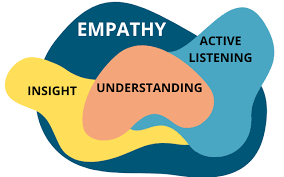
Source: ARTD Consultants
Here are some key principles:
Listening Actively
Active listening is a cornerstone of servant leadership that holds immense importance in guiding organizations through the process of digital transformation. This practice involves genuinely engaging with team members, understanding their perspectives, and fostering an environment where open communication thrives.
1. Giving Undivided Attention: Servant leaders practice active listening by giving their full attention when team members are speaking. They put aside distractions and demonstrate genuine interest in what is being conveyed.
2. Empathetic Presence: Leaders exhibit empathy through their presence. They not only listen to words but also pick up on emotional cues, acknowledging and validating the feelings being expressed.
3. Suppressing Judgment: Servant leaders refrain from making quick judgments or forming opinions prematurely. They approach conversations with an open mind, free from biases.
4. Asking Clarifying Questions: Leaders ask thoughtful questions to ensure they have a clear understanding of what is being communicated. These questions show a genuine desire to comprehend the speaker’s perspective.
5. Paraphrasing and Reflecting: Servant leaders paraphrase and reflect on what they’ve heard to confirm their understanding and to show that they value the speaker’s thoughts.
6. Creating Safe Spaces: Leaders foster an environment where team members feel comfortable expressing their ideas, concerns, and even dissenting opinions. They encourage open dialogue without fear of retribution.
7. Active Engagement: Servant leaders engage actively in conversations, offering nonverbal cues like nodding and maintaining eye contact to show that they are present and attentive.
8. Respecting Silence: Leaders understand that moments of silence can allow individuals to gather their thoughts and express themselves more thoughtfully. They allow for these pauses in conversations.
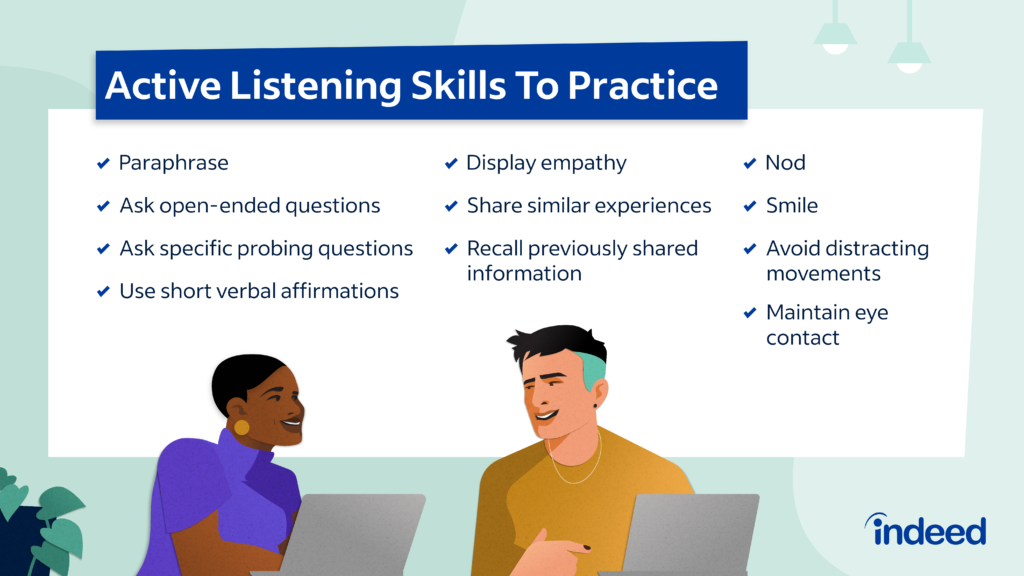
Impact on IT Transformation:
Active listening has significant implications for successful IT transformation:
• Enhanced Understanding: Active listening helps leaders truly understand the concerns, needs, and aspirations of team members in relation to digital transformation.
• Reduced Resistance: By actively listening to concerns and addressing them, leaders can mitigate resistance and foster a more cooperative attitude toward change.
• Improved Decision-Making: Leaders who actively listen gather a broader range of insights and viewpoints, leading to more well-informed and effective decision-making.
• Trust Building: Active listening builds trust between leaders and team members, creating an environment where open communication flourishes.
• Innovative Solutions: Insights gained through active listening can lead to innovative solutions that address challenges and enhance digital transformation efforts.
• Empowered Teams: When team members feel heard and understood, they are more empowered to actively contribute their expertise and ideas to the transformation process.
In summary, servant leaders who emphasize active listening create a culture of open communication and empathy. This approach not only facilitates smoother digital transformation but also builds strong relationships, empowers teams, and contributes to overall organizational success.

Acknowledging Concerns
Acknowledging concerns is a crucial practice within servant leadership that plays a significant role in guiding organizations through the challenges of IT transformation. This involves recognizing and validating the apprehensions, uncertainties, and fears that team members may experience during the transformation journey.
1. Creating a Safe Environment: Servant leaders foster an environment where team members feel comfortable expressing their concerns without fear of negative consequences. They create a culture of psychological safety where open communication is encouraged.
2. Active Listening: Leaders actively listen to the concerns raised by team members. They give their undivided attention, ask clarifying questions, and show empathy to understand the root causes of the concerns.
3. Validating Emotions: Servant leaders validate the emotions associated with concerns. They acknowledge that it’s natural for team members to feel uncertain or anxious during times of change.
4. Avoiding Judgment: Leaders refrain from passing judgment on concerns or dismissing them as insignificant. They approach each concern with respect and empathy, regardless of their own perspectives.
5. Transparent Communication: Servant leaders communicate openly about the challenges and potential risks associated with digital transformation. They provide context and information to address concerns directly.
6. Taking Concerns Seriously: Leaders demonstrate that they take concerns seriously by actively seeking solutions and involving team members in problem-solving discussions.
7. Collaborative Problem-Solving: Servant leaders involve team members in finding solutions to the concerns they’ve raised. This collaborative approach empowers individuals to contribute to the resolution process.
8. Providing Support: Leaders offer support and reassurance to team members who express concerns. They demonstrate a commitment to helping individuals navigate the uncertainties of transformation.
Impact on IT Transformation:
Acknowledging concerns has significant implications for successful digital transformation:
• Reduced Resistance: When leaders acknowledge concerns, they address potential sources of resistance upfront, creating a more conducive environment for change.
• Increased Trust: By validating emotions and concerns, leaders build trust and rapport with team members, enhancing their confidence in the transformation process.
• Open Communication: Acknowledging concerns encourages open communication, creating opportunities for solutions and improvements to be discussed openly.
• Enhanced Employee Engagement: Team members who feel heard and understood are more likely to engage actively in the transformation efforts.
• Innovation in Problem-Solving: By involving team members in problem-solving discussions, leaders tap into diverse insights that can lead to innovative solutions.
• Positive Organizational Culture: Acknowledging concerns fosters a culture where individuals feel valued and supported, contributing to a positive and adaptive organizational culture.
In summary, servant leaders who prioritize acknowledging concerns create an environment of trust, openness, and collaboration. This approach not only addresses potential roadblocks in digital transformation but also empowers team members to actively contribute their insights and ideas to the process.
Putting Themselves in Others’ Shoes
Empathy is a core principle of servant leadership, and “Putting Themselves in Others’ Shoes” involves leaders actively seeking to understand the perspectives, emotions, and experiences of team members as they navigate the challenges and changes brought about by digital transformation.
1. Active Empathy: Servant leaders practice active empathy by consciously stepping into the roles and viewpoints of their team members. They make an effort to truly grasp how individuals are affected by the transformation.
2. Seeking Understanding: Leaders proactively seek to understand the challenges, concerns, and aspirations of team members by asking questions and engaging in meaningful conversations.
3. Cultivating Emotional Intelligence: Servant leaders develop emotional intelligence, allowing them to pick up on emotional cues and respond with empathy to the feelings of team members.
4. Considering Personal Impact: Leaders reflect on how digital transformation may impact different team members on a personal and professional level. This includes understanding potential disruptions and anxieties.
5. Anticipating Reactions: Servant leaders anticipate how individuals might react to changes and uncertainties during the transformation process. They prepare to provide support and guidance based on these expectations.
6. Seeing Beyond Roles: Leaders look beyond professional roles and titles, recognizing that each individual brings unique experiences and perspectives that influence their responses to change.
7. Validation and Support: Servant leaders validate team members’ emotions and challenges by acknowledging that their concerns are real and understandable. They provide support and guidance accordingly.
8. Tailoring Communication: Leaders adjust their communication style to resonate with different team members, ensuring that messages are clear, relatable, and considerate of their concerns.
Impact on IT Transformation
“Putting Themselves in Others’ Shoes” has significant implications for successful digital transformation:
• Enhanced Communication: Leaders who understand and empathize with team members communicate in a way that resonates, leading to better comprehension and buy-in for transformation initiatives.
• Reduced Anxiety: Empathetic leaders help alleviate anxiety and uncertainty by addressing concerns in a relatable manner, fostering a more positive attitude toward change.
• Trust and Rapport: Team members develop trust and rapport with leaders who demonstrate understanding and empathy, creating a more conducive environment for collaboration.
• Cultural Transformation: This practice contributes to a culture of empathy and consideration, which can transform the organization into one that values the well-being of its employees.
• Higher Adaptability: By anticipating reactions and understanding potential hurdles, leaders can proactively address challenges, leading to a more adaptable transformation process.
• Employee Satisfaction: Team members who feel understood and valued are more likely to be satisfied with their work environment and engage actively in transformation efforts.
In summary, servant leaders who focus on “Putting Themselves in Others’ Shoes” foster an empathetic and supportive environment. This approach not only helps address individual concerns during digital transformation but also contributes to a more cohesive and resilient team that navigates change with confidence.

Addressing Resistance
Addressing resistance is a critical aspect of servant leadership that plays a pivotal role in guiding organizations through the challenges of digital transformation. This involves identifying sources of resistance, understanding their underlying causes, and working collaboratively with team members to overcome them.
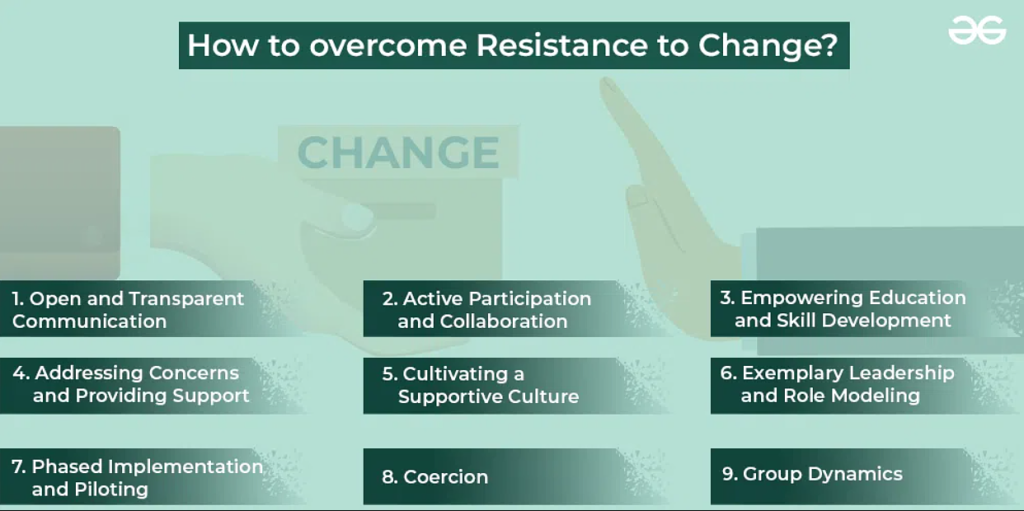
Open Dialogue: Servant leaders initiate open and honest dialogues with team members to understand their concerns, doubts, and apprehensions related to digital transformation.
Active Listening: Leaders actively listen to team members’ resistance points, demonstrating empathy and a genuine desire to understand their perspectives.
Seeking Root Causes: Servant leaders dig deeper to uncover the root causes of resistance. They identify whether resistance is due to fear of change, uncertainty, lack of information, or other factors.
Transparency: Leaders provide transparent information about the rationale, benefits, and goals of the digital transformation. Transparent communication helps dispel misconceptions and build trust.
Empowering Ownership: Servant leaders involve resistant team members in decision-making processes related to transformation. This empowers them to take ownership and influence the changes.
Collaborative Problem-Solving: Leaders collaborate with resistant team members to collectively identify solutions to challenges posed by digital transformation. This collaborative approach builds buy-in.
Addressing Concerns: Servant leaders address resistance head-on by directly addressing concerns, providing information, and clarifying misconceptions.
Providing Support: Leaders offer support to individuals who may be struggling with adapting to the changes. They provide resources, training, and guidance to alleviate concerns.
Impact on IT Transformation
Addressing resistance has significant implications for successful digital transformation:
• Reduced Friction: By identifying and addressing resistance, leaders mitigate friction and create a more harmonious environment for the implementation of digital changes.
• Enhanced Buy-In: Addressing concerns and involving resistant team members in solutions can lead to increased buy-in and commitment to the transformation process.
• Positive Change Culture: A culture of addressing resistance fosters a positive attitude toward change and encourages team members to view challenges as opportunities for growth.
• Innovative Insights: Resistant team members may provide valuable insights that can lead to improvements in the transformation strategy and enhance overall outcomes.
• Empowerment: By involving resistant team members in decision-making and problem-solving, leaders empower them to contribute meaningfully to the transformation journey.
• Stronger Collaboration: Addressing resistance collaboratively promotes stronger collaboration, as team members feel valued and included in the decision-making process.
In summary, servant leaders who prioritize addressing resistance create an environment of trust, transparency, and collaboration. This approach not only helps overcome hurdles during digital transformation but also builds stronger relationships, fosters a culture of continuous improvement, and contributes to the organization’s long-term success.

Tailored Communication
Tailored communication is a key practice within servant leadership that holds substantial importance in guiding organizations through the complexities of digital transformation. This practice involves adapting communication styles, messages, and approaches to effectively engage diverse team members based on their individual preferences and needs.
1. Understanding Individual Preferences: Servant leaders take the time to understand the communication preferences of each team member. This includes considering factors such as preferred communication channels, language, and tone.
2. Empathy-Driven Approach: Leaders adopt an empathy-driven approach by putting themselves in the shoes of team members. They consider how information would be best received from the perspective of each individual.
3. Adapting to Learning Styles: Servant leaders recognize that team members have different learning styles—visual, auditory, kinesthetic, etc. They adjust communication methods to align with these styles.
4. Customizing Depth of Information: Leaders tailor the depth and complexity of information based on the roles and responsibilities of team members. They avoid overwhelming individuals with unnecessary technical details.
5. Clarity and Simplicity: Servant leaders communicate complex technological concepts in clear, simple language that is easily understandable by non-technical team members.
6. Two-Way Communication: Leaders foster a culture of two-way communication where team members feel comfortable asking questions, seeking clarifications, and expressing their thoughts.
7. Timely Updates: Servant leaders provide timely updates and information related to digital transformation, ensuring that team members are informed of progress and changes.
8. Visual Aids and Examples: Leaders use visual aids, diagrams, and real-world examples to help team members visualize abstract concepts related to technology.
Impact on IT Transformation
Tailored communication has significant implications for successful digital transformation:
• Enhanced Understanding: Team members better understand the goals, benefits, and processes of digital transformation when communication is tailored to their preferences.
• Reduced Confusion: Clear and tailored communication reduces confusion and minimizes the risk of misinterpretation or misinformation.
• Higher Engagement: Team members engage more actively when they feel communication speaks directly to their needs and concerns.
• Faster Adoption: Tailored communication accelerates the adoption of new technologies, as team members are more likely to embrace changes when they understand their relevance.
• Cultural Inclusivity: Tailoring communication considers diverse backgrounds, languages, and cultures, fostering inclusivity and understanding.
• Positive Team Relationships: By catering to individual preferences, leaders build positive relationships and trust with team members.
In summary, servant leaders who emphasize tailored communication create an environment where information is accessible, understandable, and relevant to every team member. This approach not only facilitates smoother digital transformation but also contributes to a culture of open communication, engagement, and collaboration.

Providing Reassurance
Providing reassurance is a fundamental practice within servant leadership that plays a vital role in guiding organizations through the challenges of digital transformation. This practice involves offering support, encouragement, and confidence-building measures to team members as they navigate uncertainties and changes.
1. Recognizing Emotional Impact: Servant leaders understand that digital transformation can evoke emotions such as fear, anxiety, and uncertainty among team members. They acknowledge and address these emotions.
2. Creating a Supportive Atmosphere: Leaders cultivate an environment where team members feel comfortable expressing their concerns and seeking reassurance without fear of negative repercussions.
3. Open Communication: Servant leaders maintain open lines of communication, encouraging team members to share their thoughts, questions, and apprehensions about the transformation process.
4. Acknowledging Challenges: Leaders acknowledge the challenges associated with digital transformation and express empathy toward team members who may find certain aspects difficult.
5. Sharing Success Stories: Servant leaders share success stories and examples of positive outcomes resulting from digital transformation. This helps build confidence and optimism among team members.
6. Offering Clear Guidelines: Leaders provide clear guidelines and expectations regarding the transformation journey. Clarity reduces uncertainty and helps team members understand what is expected of them.
7. Timely Feedback: Servant leaders provide timely feedback on team members’ progress and contributions to digital transformation efforts. Positive feedback boosts morale and motivation.
8. Availability and Support: Leaders make themselves available to address concerns, answer questions, and offer guidance throughout the transformation process.
Impact on IT Transformation
Providing reassurance has significant implications for successful digital transformation:
• Reduced Stress: Reassurance alleviates stress and anxiety associated with uncertainty, leading to a more positive and productive work environment.
• Enhanced Resilience: Team members who feel supported and reassured are more resilient in the face of challenges, adapting more effectively to changes.
• Boosted Morale: Reassurance boosts team morale and motivation, encouraging individuals to remain committed to the transformation journey.
• Trust Building: Providing reassurance builds trust between leaders and team members, fostering a stronger sense of partnership.
• Increased Confidence: Reassured team members feel more confident in their abilities to navigate the transformation process, contributing to higher performance.
• Enhanced Engagement: Reassured team members are more likely to engage actively in transformation efforts, embracing change with a positive attitude.
In summary, servant leaders who emphasize providing reassurance create a supportive and encouraging environment during digital transformation. This approach not only helps individuals cope with challenges but also contributes to a culture of trust, open communication, and collaboration, ultimately leading to successful transformation outcomes.

Individualized Support
Individualized support is a pivotal practice within servant leadership that plays a crucial role in guiding organizations through the intricacies of digital transformation. This practice involves recognizing the unique needs, strengths, and challenges of each team member and providing tailored assistance to help them thrive during the transformation journey.
Source: Leadership Excellence
1. Personalized Approach: Servant leaders take a personalized approach to support, recognizing that each team member’s abilities, experiences, and comfort levels with technology vary.
2. Understanding Strengths: Leaders identify the strengths and skills of each team member and leverage these to align their contributions with digital transformation initiatives.
3. Assessing Skill Gaps: Servant leaders assess individual skill gaps and areas where team members might require additional training or development to excel in the digital landscape.
4. Tailored Training: Leaders provide targeted training opportunities that address specific skill gaps and empower team members to contribute effectively to digital transformation efforts.
5. One-on-One Guidance: Servant leaders offer one-on-one guidance and mentoring to individuals who may need extra support to understand and adapt to technological changes.
6. Adapting Pace: Leaders consider the pace at which each team member can comfortably learn and adapt to new technologies, avoiding overwhelming them.
7. Encouraging Experimentation: Servant leaders encourage team members to experiment and explore new technologies without the fear of making mistakes.
8. Recognizing Progress: Leaders acknowledge and celebrate the progress and growth of each team member as they embrace digital transformation, reinforcing their efforts.
Impact on IT Transformation
Individualized support has significant implications for successful digital transformation:
• Optimized Contributions: By tailoring support to individual strengths and skills, leaders maximize the contributions of each team member to digital transformation initiatives.
• Skill Development: Individualized support accelerates skill development, helping team members become more proficient in using new technologies.
• Reduced Resistance: When team members receive personalized guidance and support, they are more likely to embrace change and show reduced resistance.
• Empowerment: Individualized support empowers team members by providing them with the tools and knowledge needed to succeed in the digital landscape.
• Positive Team Dynamics: Leaders who provide personalized support foster a culture of inclusivity, respect, and collaboration among team members.
• Higher Engagement: Team members who receive tailored support feel valued and engaged, leading to increased commitment to digital transformation efforts.
In summary, servant leaders who emphasize individualized support create an environment where team members can thrive and contribute effectively to digital transformation. This approach not only enhances the quality of technological solutions but also fosters a culture of continuous learning, adaptability, and collaborative success.

Empathy Beyond Words
Empathy beyond words is a profound practice within servant leadership that plays a vital role in guiding organizations through the complexities of digital transformation. This practice involves expressing empathy not only through verbal communication but also through actions, gestures, and consistent behaviors that demonstrate genuine concern for the well-being and success of team members.

1. Nonverbal Cues: Servant leaders use nonverbal cues such as facial expressions, body language, and eye contact to convey empathy. These cues reinforce the sincerity of their concern.
2. Attentive Presence: Leaders demonstrate attentive presence during conversations, showing that they are fully engaged and focused on understanding the emotions and concerns being expressed.
3. Availability: Servant leaders make themselves available to team members for discussions, questions, and support, emphasizing that they are approachable and receptive.
4. Time Investment: Leaders invest time in meaningful interactions with team members, dedicating moments to truly connect and understand their experiences.
5. Sensitivity: Servant leaders are sensitive to the emotional well-being of team members, offering support and reassurance when challenges arise.
6. Supportive Actions: Leaders take concrete actions to support team members, such as providing resources, training, and opportunities for growth in the context of digital transformation.
7. Sharing Experiences: Servant leaders may share their own experiences and challenges related to digital transformation, creating a sense of relatability and shared understanding.
8. Follow-Up: Leaders follow up on discussions and concerns, demonstrating that they genuinely care about the progress and well-being of team members.
Impact on IT Transformation
Empathy beyond words has significant implications for successful digital transformation:
• Trust Building: Demonstrating consistent empathy fosters trust between leaders and team members, creating an environment where individuals feel valued and understood.
• Enhanced Well-Being: Team members who experience empathy beyond words have better emotional well-being, leading to increased job satisfaction and engagement.
• Stronger Relationships: Empathy-driven interactions contribute to stronger relationships between leaders and team members, as well as among team members themselves.
• Open Communication: Empathy encourages open communication, enabling team members to express their thoughts and concerns without hesitation.
• Resilience: Empathy helps team members cope with challenges and setbacks during digital transformation, enhancing their resilience and adaptability.
• Cultural Transformation: A culture of empathy beyond words contributes to a positive, supportive, and inclusive organizational culture.
In summary, servant leaders who emphasize empathy beyond words create an environment where team members feel genuinely cared for and supported. This approach not only facilitates smoother IT transformation but also nurtures a culture of understanding, collaboration, and shared success.

Case Study: Satya Nadella and Microsoft – Cultivating Empathy in Servant Leadership
Background: Satya Nadella is the CEO of Microsoft, one of the world’s largest technology companies. When Nadella took over as CEO in 2014, he aimed to transform Microsoft’s culture and leadership style. He introduced a strong emphasis on empathy and understanding, aligning with the principles of servant leadership.
Application of Empathy and Understanding:
1. Cultural Transformation: Upon becoming CEO, Nadella recognized the need for a cultural shift within Microsoft. He wanted to move away from a competitive and hierarchical culture and create an environment of collaboration and empathy. He initiated a company-wide cultural transformation that encouraged employees to listen, learn, and understand each other’s perspectives.
2. Embracing Diversity and Inclusion: Nadella prioritized diversity and inclusion, recognizing that a diverse workforce brings a range of perspectives that can drive innovation. He emphasized the importance of creating an inclusive environment where every employee feels valued and understood, regardless of their background.
3. Leading with Empathy: Nadella demonstrated his commitment to empathy through his leadership style. He actively engaged in open conversations with employees, customers, and partners, listening to their feedback and understanding their needs. He encouraged managers and leaders at Microsoft to adopt a similar approach, fostering a culture of understanding and empathy throughout the organization.
4. Customer-Centric Approach: Nadella believed in putting customers at the center of everything Microsoft does. By empathizing with customers’ challenges and needs, he encouraged the company to develop products and solutions that truly address customer pain points. This customer-centric mindset helped Microsoft regain its innovative edge.
5. Supporting Employee Growth: Nadella promoted a growth mindset among employees, encouraging them to learn and develop continuously. He recognized that employees might face failures and setbacks, and he used these moments as opportunities to understand their challenges and provide support. This approach created a sense of psychological safety and trust within the organization.
Results:
Under Satya Nadella’s empathetic leadership, Microsoft experienced significant positive outcomes:
• Cultural Transformation: Microsoft’s culture shifted toward one of collaboration, innovation, and empathy.
• Financial Performance: The company’s stock price and financial performance improved under Nadella’s leadership, demonstrating that a people-centered approach can lead to business success.
• Product Innovation: Microsoft launched successful products like Azure and Surface under Nadella’s leadership, reflecting a deeper understanding of customer needs.
• Employee Engagement: Employee morale and engagement improved, leading to increased productivity and creativity.
Conclusion:
Satya Nadella’s leadership at Microsoft exemplifies the integration of empathy and understanding into servant leadership. By fostering a culture of empathy, he created an environment where employees, customers, and partners felt valued, understood, and motivated to contribute to the company’s success. This case study demonstrates that empathy-driven leadership not only enhances organizational culture but also drives innovation, collaboration, and business growth.

Course Manual 2: Clear Communication
Effective communication is a cornerstone of servant leadership and plays a pivotal role in navigating teams through the intricacies of IT transformation. It encompasses transparently sharing information, setting expectations, and outlining objectives to ensure a shared understanding among all team members. This ensures alignment and clarity regarding the motives driving the transformation endeavors.
Articulating Vision
Articulating vision is a crucial practice within servant leadership that plays a central role in guiding organizations through the process of IT transformation. This practice involves clearly communicating a compelling and inspiring vision for the future state of the organization, aligning team members’ efforts and motivating them to work collaboratively toward shared goals.
1. Clarity of Direction: Servant leaders provide a clear and concise vision of what the organization aims to achieve through IT transformation. This clarity helps team members understand the purpose and direction of their efforts.
2. Inspiration and Motivation: Leaders articulate a vision that goes beyond technical aspects, inspiring team members by highlighting the positive impact of their work on customers, the organization, and even society.
3. Connecting to Values: Servant leaders link the vision to the core values of the organization, demonstrating how digital transformation aligns with the organization’s fundamental beliefs.
4. Realistic Yet Ambitious: Leaders strike a balance between realism and ambition in their vision. The vision should be attainable while challenging team members to strive for excellence.
5. Engaging Communication: Servant leaders use compelling communication techniques, such as storytelling, metaphors, and vivid imagery, to engage team members emotionally and intellectually.
6. Painting the Future State: Leaders describe the desired future state of the organization after successful digital transformation, helping team members visualize the end goal.
7. Inclusivity: Servant leaders involve team members in shaping the vision, making them feel invested and engaged in the transformation journey.
8. Consistency: Leaders consistently reinforce the vision through various communication channels, ensuring that it remains a guiding force throughout the transformation process.
Impact on IT Transformation
Articulating vision has significant implications for successful IT transformation:
• Unified Direction: A clear and compelling vision aligns team members’ efforts, ensuring that everyone is moving in the same direction and working toward common goals.
• Motivated Teams: An inspiring vision motivates team members to invest their time and energy in digital transformation efforts, boosting overall engagement.
• Focus on Meaningful Goals: A well-articulated vision helps team members understand the importance and impact of their work, leading to a focus on meaningful goals.
• Cohesive Collaboration: A shared vision fosters collaboration among team members, as they work together with a shared purpose and sense of belonging.
• Resilience: Team members are more resilient in the face of challenges when they are driven by a clear and compelling vision of the positive outcomes.
• Enhanced Creativity: A visionary goal encourages innovative thinking and creative problem-solving to achieve the desired transformation outcomes.
Servant leaders who emphasize articulating vision create an environment of shared purpose, motivation, and direction. This approach not only enhances the quality of technological solutions but also cultivates a culture of unity, innovation, and relentless pursuit of organizational excellence through digital transformation.
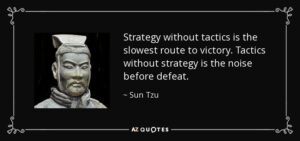
Sharing Strategy
Sharing strategy is a critical practice within servant leadership that plays a vital role in guiding organizations through the complexities of IT transformation. This practice involves openly communicating the overarching plan, objectives, and rationale behind the IT transformation efforts to ensure alignment, understanding, and commitment from all team members.
1. Transparency: Servant leaders practice transparency by openly sharing the strategic plan for digital transformation. They provide insights into the goals, priorities, and the reasoning driving the transformation process.
2. Clear Objectives: Leaders clearly outline the objectives and expected outcomes of the transformation. This clarity helps team members understand what is being pursued and why.
3. Rationale and Benefits: Servant leaders explain the rationale behind the chosen strategy and the potential benefits it will bring to the organization, customers, and stakeholders.
4. Alignment with Values: Leaders demonstrate how the transformation strategy aligns with the organization’s core values, ensuring that team members see a connection between their work and the organization’s principles.
5. Long-Term Vision: Servant leaders communicate the long-term vision that the strategy aims to achieve. This provides context for short-term actions and decisions.
6. Inclusive Approach: Leaders involve team members in discussions about the strategy, encouraging them to provide insights, ask questions, and offer suggestions for refinement.
7. Open Dialogue: Servant leaders create an environment where team members can openly discuss the strategy, voice concerns, and seek clarifications without fear of retribution.
8. Regular Updates: Leaders provide consistent updates on the progress of the strategy, ensuring that team members are informed about any adjustments or shifts in the plan.
Impact on IT Transformation
Sharing strategy has significant implications for successful IT transformation:
• Alignment: When team members are aware of the strategic plan, they align their efforts with the overall direction, leading to a more coordinated approach to digital transformation.
• Motivation: An understanding of the strategy and its benefits motivates team members to invest their time and energy into the transformation process.
• Informed Decision-Making: A shared strategy enables team members to make informed decisions that align with the organization’s transformation goals.
• Adaptability: Team members who are familiar with the strategy are better equipped to adapt to changes and uncertainties that arise during the transformation journey.
• Ownership: An inclusive approach to sharing the strategy encourages a sense of ownership among team members, as they contribute their insights and ideas.
• Empowerment: When team members understand the strategy, they feel empowered to contribute their expertise and innovative solutions.
In summary, servant leaders who emphasize sharing strategy create an environment of clarity, alignment, and collaboration. This approach not only facilitates smoother digital transformation but also fosters a culture of engagement, ownership, and continuous improvement among team members.

Explaining Benefits
Explaining benefits is a pivotal practice within servant leadership that plays a critical role in guiding organizations through the complexities of digital transformation. This practice involves transparently communicating the positive outcomes, advantages, and value that the digital transformation efforts will bring to the organization, its stakeholders, and team members.
1. Clarity of Value: Servant leaders provide a clear and comprehensive explanation of the benefits that will result from the successful execution of the digital transformation strategy. This clarity helps team members understand the significance of their contributions.
2. Alignment with Goals: Leaders link the benefits of digital transformation to the broader goals of the organization, demonstrating how these outcomes contribute to the organization’s success.
3. Stakeholder Impact: Servant leaders communicate how the transformation’s benefits extend to various stakeholders, such as customers, partners, investors, and employees.
4. Real-World Impact: Leaders provide concrete examples of how the transformation will positively impact specific aspects of the organization, such as operational efficiency, customer experience, or innovation.
5. Personal Relevance: Servant leaders explain how the benefits relate to individual team members’ roles and contributions, helping them see the direct impact of their efforts.
6. Addressing Concerns: Leaders address potential concerns or skepticism about the benefits by providing evidence, data, and insights that support the anticipated positive outcomes.
7. Long-Term Perspective: Servant leaders emphasize not only immediate gains but also the long-term advantages of digital transformation, encouraging a sustained commitment to the process.
8. Encouraging Engagement: Leaders invite team members to ask questions and share their perspectives on the benefits, fostering a sense of open dialogue and collaboration.
Impact on IT Transformation
Explaining benefits has significant implications for successful IT transformation:
• Motivation: An understanding of the benefits motivates team members to actively participate in digital transformation efforts, knowing that their contributions lead to positive outcomes.
• Alignment: When team members grasp the benefits, they align their actions with the transformation goals, fostering a more cohesive and coordinated approach.
• Stakeholder Buy-In: Clear benefits help gain buy-in from stakeholders by demonstrating the value and impact of the transformation on their interests.
• Risk Mitigation: Explaining benefits can mitigate resistance and uncertainties, as team members see the potential rewards outweighing the risks.
• Focused Efforts: An awareness of benefits directs team members’ efforts toward actions that contribute most to the realization of these advantages.
• Innovation: Understanding the benefits encourages team members to think creatively and contribute innovative solutions that enhance the transformation process.
Servant leaders who emphasize explaining benefits create an environment of purpose, motivation, and alignment. This approach not only facilitates smoother digital transformation but also cultivates a culture of shared vision, engagement, and a collective drive to achieve positive outcomes.

Transparency
Transparency is a foundational practice within servant leadership that plays a crucial role in guiding organizations through the challenges of IT transformation. This practice involves being open, honest, and forthright in sharing information, decisions, and updates related to the transformation efforts to build trust and foster a collaborative environment.
1. Open Communication: Servant leaders prioritize open communication by sharing relevant information about the digital transformation strategy, progress, challenges, and decisions.
2. Clear Communication: Leaders ensure that information is communicated clearly, avoiding jargon and technical language that might create confusion among non-technical team members.
3. Sharing Context: Servant leaders provide the context behind decisions and changes related to digital transformation, helping team members understand the reasoning and implications.
4. Honesty: Leaders are honest about the challenges and obstacles the organization may face during the transformation, acknowledging potential setbacks and uncertainties.
5. Decision Transparency: Servant leaders explain how decisions are made, the factors considered, and how team members’ input is taken into account.
6. Feedback Loop: Leaders establish a feedback loop where team members can ask questions, share concerns, and offer suggestions about the transformation process.
7. Adaptation: Servant leaders communicate openly when adjustments to the strategy are needed, explaining the reasons for changes and how they align with the organization’s goals.
8. Inclusivity: Leaders involve team members in discussions and decisions related to digital transformation, fostering a culture of shared ownership and collaboration.
Impact on IT Transformation
Transparency has significant implications for successful IT transformation:
• Trust Building: Transparent communication builds trust between leaders and team members, creating an environment where honesty and integrity are valued.
• Engagement: Transparent leaders foster higher levels of engagement among team members who feel informed, involved, and respected.
• Empowerment: When team members have access to transparent information, they feel empowered to contribute meaningfully to the transformation process.
• Accountability: Transparent leaders take responsibility for their decisions and actions, setting a positive example for accountability.
• Mitigated Rumors: Open communication prevents the spread of rumors and misinformation, minimizing unnecessary anxiety and concerns.
• Faster Adaptation: Transparent leaders make it easier for team members to adapt to changes by providing a clear understanding of the reasons behind them.
In summary, servant leaders who emphasize transparency create an environment of honesty, trust, and collaboration. This approach not only facilitates smoother digital transformation but also cultivates a culture of open dialogue, shared responsibility, and a united effort toward achieving the organization’s goals.

Two-Way Communication
Two-way communication is a pivotal practice within servant leadership that plays a vital role in guiding organizations through the complexities of digital transformation. This practice involves creating a dynamic and open dialogue where leaders actively listen to team members’ input, concerns, and ideas while also sharing information and updates in return.
Active Listening: Servant leaders actively listen to team members, demonstrating genuine interest in their perspectives, questions, and feedback related to the digital transformation.
Creating Safe Spaces: Leaders foster an environment where team members feel comfortable expressing their thoughts, even if they differ from the mainstream viewpoints.
Encouraging Feedback: Servant leaders encourage team members to provide feedback on the transformation process, changes, and challenges they encounter.
Prompt Responses: Leaders respond promptly to questions and concerns, demonstrating that team members’ voices are valued and that their contributions matter.
Empathy: Servant leaders show empathy and understanding when engaging in two-way communication, ensuring that team members feel heard and acknowledged.
Open Forums: Leaders facilitate open forums, meetings, or digital platforms where team members can engage in discussions and share insights about the transformation journey.
Collaborative Problem-Solving: Servant leaders involve team members in problem-solving discussions, working together to find solutions to challenges arising from the transformation.
Sharing Insights: Leaders openly share insights gained from team members’ feedback, demonstrating that their input directly influences decision-making.
Impact on IT Transformation
Two-way communication has significant implications for successful IT transformation:
• Enhanced Understanding: Open dialogue helps leaders understand team members’ concerns and viewpoints, enabling them to make more informed decisions.
• Engagement: Two-way communication fosters higher engagement among team members, as they feel involved and valued in the transformation process.
• Innovation: Team members’ diverse perspectives contribute to innovative solutions, improving the quality of digital transformation strategies and outcomes.
• Reduced Resistance: Addressing concerns and questions through two-way communication reduces resistance to change, as team members feel their concerns are taken seriously.
• Cohesive Teams: Open dialogue nurtures a culture of collaboration and shared responsibility, leading to stronger, more cohesive teams.
• Mutual Respect: Two-way communication cultivates mutual respect between leaders and team members, creating a harmonious work environment.
Servant leaders who emphasize two-way communication create an environment of inclusivity, collaboration, and understanding. This approach not only facilitates smoother digital transformation but also fosters a culture of active participation, continuous improvement, and collective achievement of transformation goals.

Listening and Feedback
Listening and feedback is a fundamental practice within servant leadership that plays a critical role in guiding organizations through the challenges of digital transformation. This practice involves actively listening to team members’ perspectives, concerns, and ideas while providing constructive feedback that supports their growth and contributes to the success of the transformation.

Source: Indiana State University Press Sites
1. Active Listening: Servant leaders engage in active listening, giving their full attention to team members’ verbal and nonverbal communication to truly understand their viewpoints.
2. Creating a Safe Space: Leaders establish an environment where team members feel safe expressing their thoughts, knowing that their input will be respected and considered.
3. Open-Ended Questions: Servant leaders ask open-ended questions that encourage team members to share insights, experiences, and ideas related to digital transformation.

4. Reflective Listening: Leaders practice reflective listening by paraphrasing what team members have shared, confirming understanding, and demonstrating empathy.
5. Empathetic Responses: Servant leaders respond with empathy and understanding, acknowledging team members’ emotions and concerns during discussions.
6. Feedback Loop: Leaders establish a continuous feedback loop, inviting team members to share feedback not only on their experiences but also on the transformation strategy itself.
7. Constructive Feedback: Servant leaders offer constructive feedback that highlights strengths and suggests areas for improvement, fostering a culture of continuous learning.
8. Timely Feedback: Leaders provide feedback in a timely manner, ensuring that team members receive guidance and support when it matters most.
Impact on IT Transformation
Listening and feedback have significant implications for successful IT transformation:
• Engagement: Actively listening to team members’ opinions and providing feedback demonstrates that their voices are valued, leading to higher engagement.
• Informed Decisions: Team members’ insights contribute to better-informed decisions about the transformation process, leading to more effective strategies.
• Continuous Improvement: Constructive feedback fosters a culture of continuous improvement, motivating team members to enhance their skills and contributions.
• Enhanced Collaboration: Open dialogue and feedback encourage collaboration among team members, promoting shared ownership of transformation goals.
• Adaptability: Feedback enables the organization to adapt and refine the transformation strategy based on real-time insights from team members.
• Trust Building: Listening and providing feedback build trust between leaders and team members, fostering stronger relationships.
In summary, servant leaders who emphasize listening and feedback create an environment of openness, growth, and collaboration. This approach not only facilitates smoother digital transformation but also nurtures a culture of active participation, innovation, and collective commitment to achieving the organization’s transformation objectives.

Customized Communication
Customized communication is a vital practice within servant leadership that plays a critical role in guiding organizations through the complexities of digital transformation. This practice involves tailoring communication styles, methods, and content to cater to the diverse needs, preferences, and backgrounds of team members.
Understanding Diversity: Servant leaders recognize that team members have diverse communication preferences, learning styles, and cultural backgrounds that influence how they receive and process information.
Personalized Approach: Leaders take a personalized approach to communication, considering the unique characteristics of each team member and adapting their communication accordingly.
Preferred Channels: Servant leaders identify the communication channels preferred by different team members, whether it’s face-to-face meetings, emails, instant messaging, or video conferences.
Language and Terminology: Leaders use language and terminology that resonate with team members, ensuring that technical concepts are explained in a way that is understandable to all.
Visual and Auditory Learners: Servant leaders adapt communication methods to accommodate different learning styles, using visual aids for visual learners and explaining verbally for auditory learners.
Sensitivity to Cultural Differences: Leaders take into account cultural differences that might affect communication norms and adjust their approach to ensure inclusivity.
Adjusting Depth: Servant leaders customize the depth of technical information based on team members’ roles and backgrounds, avoiding overwhelming non-technical individuals with excessive details.
Encouraging Questions: Leaders create an environment where team members feel comfortable asking questions and seeking clarification, regardless of their level of familiarity with technology.
Impact on IT Transformation
Customized communication has significant implications for successful IT transformation:
• Enhanced Understanding: Team members better understand and retain information when communication is tailored to their preferences and learning styles.
• Engagement: Customized communication demonstrates that leaders value and respect individual differences, leading to higher engagement and participation.
• Inclusivity: Tailored communication fosters inclusivity by catering to various backgrounds, ensuring that all team members feel included and understood.
• Effective Decision-Making: Clear and customized communication leads to well-informed decision-making by ensuring that all team members have a comprehensive grasp of the situation.
• Reduced Miscommunication: Customized communication minimizes the risk of misinterpretation or confusion that can arise from a one-size-fits-all approach.
• Positive Work Environment: Customization creates a positive work environment where team members feel respected and empowered, contributing to a strong team culture.
In summary, servant leaders who emphasize customized communication create an environment of understanding, collaboration, and inclusivity. This approach not only facilitates smoother digital transformation but also nurtures a culture of effective communication, engagement, and appreciation for diversity within the organization.

Regular Updates
Regular updates are a pivotal practice within servant leadership that plays a critical role in guiding organizations through the intricacies of digital transformation. This practice involves consistently providing timely and relevant information to team members to keep them informed about the progress, changes, and developments in the transformation journey.
1. Timely Communication: Servant leaders ensure that updates are provided on a regular basis, keeping team members informed about the latest developments in the digital transformation process.
2. Clear and Concise: Leaders communicate updates in a clear and concise manner, avoiding unnecessary technical jargon that might hinder understanding.
3. Key Milestones: Servant leaders highlight key milestones, achievements, and progress points reached in the digital transformation journey to celebrate successes and motivate team members.
4. Challenges and Solutions: Leaders transparently communicate challenges faced during the transformation process and provide insights into the strategies being employed to overcome them.
5. Potential Impacts: Servant leaders communicate potential impacts of changes or decisions related to the transformation, allowing team members to anticipate and prepare for adjustments.
6. Interactive Platforms: Leaders leverage interactive platforms such as town hall meetings, webinars, or digital collaboration tools to engage in real-time updates and discussions.
7. Feedback Incorporation: Servant leaders use regular updates as an opportunity to incorporate feedback received from team members, demonstrating that their input is valued and considered.
8. Availability for Questions: Leaders make themselves available after updates to address any questions or concerns that team members may have, ensuring a clear understanding.
Impact on IT Transformation
Regular updates have significant implications for successful IT transformation:
• Engagement: Regular updates keep team members engaged by providing them with a sense of involvement and keeping them informed about the transformation’s progress.
• Transparency: Open and consistent updates foster a culture of transparency, where team members feel well-informed about the organization’s initiatives.
• Alignment: Regular updates ensure that team members remain aligned with the transformation goals, avoiding any misinterpretations or divergent understandings.
• Empowerment: Updates empower team members with relevant information, enabling them to make informed decisions and contribute more effectively.
• Adaptability: Timely updates allow team members to adapt to changes and uncertainties more efficiently, as they are aware of the evolving situation.
• Trust Building: Consistent updates build trust between leaders and team members, creating an environment of reliability and credibility.
A servant leader who emphasizes regular updates creates an environment of transparency, engagement, and adaptability. This approach not only facilitates smoother digital transformation but also nurtures a culture of open communication, shared ownership, and continuous improvement within the organization.

Clear Expectations
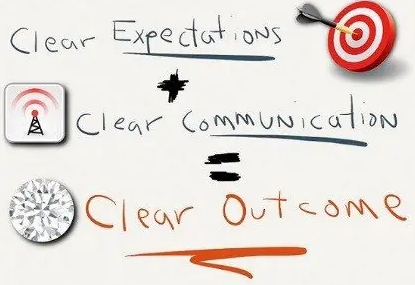
Source: California Intercontinental University
Clear expectations are a fundamental practice within servant leadership that plays a crucial role in guiding organizations through the intricacies of digital transformation. This practice involves setting and communicating clear and realistic expectations for team members regarding their roles, responsibilities, contributions, and performance during the transformation journey.
1. Role Clarity: Servant leaders ensure that team members have a clear understanding of their roles in the digital transformation process. This includes defining responsibilities, tasks, and contributions.
2. Performance Standards: Leaders set performance standards and goals that are aligned with the organization’s transformation objectives. This helps team members understand what is expected of them.
3. Task Prioritization: Servant leaders prioritize tasks and outline their order of importance to guide team members in focusing on the most critical aspects of the transformation.
4. Alignment with Strategy: Leaders explain how each team member’s contributions are linked to the broader digital transformation strategy, demonstrating the relevance of their work.
5. Measurement Criteria: Servant leaders define measurable criteria for success, allowing team members to track their progress and contributions against transformation goals.
6. Communication Channels: Leaders specify the preferred channels of communication and collaboration for different tasks and aspects of the digital transformation.
7. Feedback Expectations: Servant leaders communicate their expectations for feedback, suggestions, and updates from team members, promoting a culture of open communication.
8. Adaptability: Leaders clarify that adaptability is expected, as the transformation journey may require adjustments and learning based on new information.
Impact on IT Transformation
Clear expectations have significant implications for successful IT transformation:
• Focus and Productivity: Clear expectations guide team members’ efforts toward meaningful tasks, enhancing their focus and overall productivity.
• Motivation: Understanding how their contributions contribute to the transformation’s success motivates team members to invest their energy and skills.
• Accountability: Clear expectations promote accountability, as team members have a clear understanding of their responsibilities and performance standards.
• Reduced Confusion: Clarity eliminates confusion and misinterpretation, leading to smoother execution of tasks and fewer errors.
• Collaboration: When team members understand their roles and contributions, collaboration becomes more seamless and coordinated.
• Engagement: Clear expectations create a sense of purpose and involvement, leading to higher engagement throughout the transformation journey.
In summary, servant leaders who emphasize clear expectations create an environment of clarity, accountability, and collaboration. This approach not only facilitates smoother digital transformation but also nurtures a culture of achievement, ownership, and shared commitment to the organization’s transformational goals.

Case Study Southwest Airlines
Company Background: Southwest Airlines, founded in 1967, is a well-known American low-cost airline with a strong emphasis on customer service and employee engagement. The airline’s success is often attributed to its unique approach to leadership and organizational culture.
Clear Communication in Servant Leadership:
Scenario: Herb Kelleher, the co-founder and former CEO of Southwest Airlines, exemplified servant leadership principles in his leadership style. One of the key elements of his approach was clear and open communication.
1. Alignment with Core Values: Southwest Airlines had a set of core values that emphasized putting people first, including employees and customers. Kelleher consistently communicated these values across the organization, aligning everyone’s actions with the company’s mission and vision.
2. Sharing the Vision: Kelleher was known for his hands-on and accessible leadership style. He communicated the company’s vision and goals directly to employees through regular meetings, company-wide emails, and even onboard announcements. This ensured that all employees were aware of the direction the company was heading in.
3. Transparency: Kelleher maintained a culture of transparency by sharing both successes and challenges with the entire organization. This open communication created a sense of shared responsibility among employees and encouraged them to contribute ideas for improvement.
4. Empowerment: Clear communication empowered employees at all levels to take ownership of their roles. Kelleher believed that employees who were well-informed were better equipped to make decisions aligned with the company’s values.
5. Listening and Feedback: Kelleher actively listened to employees’ concerns, suggestions, and feedback. This approach created a two-way communication channel where employees felt valued and heard, fostering a sense of belonging and commitment.
Impact:
Southwest Airlines’ emphasis on clear communication through servant leadership principles had several positive outcomes:
• Improved Employee Engagement: Employees felt a strong sense of purpose and connection to the company’s mission, leading to higher engagement levels.
• Strong Organizational Culture: The transparent and open communication culture fostered a positive working environment and a cohesive team spirit.
• Enhanced Customer Experience: Employees who understood the company’s values and goals were better equipped to deliver exceptional customer service.
• Crisis Management: During times of crisis, such as the aftermath of the September 11 attacks, Kelleher’s transparent communication reassured employees and minimized anxiety.
In conclusion, the case of Southwest Airlines demonstrates how clear communication, as a core aspect of servant leadership, can lead to a thriving organizational culture, empowered employees, and sustainable success. Herb Kelleher’s approach to communication not only aligned everyone in the organization but also helped shape the airline’s reputation for outstanding customer service and employee satisfaction.

Source: John Spencer
Course Manual 3: Empowerment and Collaboration
Empowerment and collaboration stand as integral components of servant leadership that hold a central position in steering organizations through the complexities of IT transformation. These core tenets encompass bestowing autonomy, nurturing teamwork, and motivating individuals to offer their expertise and contributions to the journey of transformation.
Autonomy and Decision-Making
Autonomy and decision-making are foundational principles within servant leadership that play a crucial role in guiding organizations through the challenges of IT transformation. This principle involves empowering team members by granting them the freedom to make decisions, take ownership of their tasks, and contribute their expertise to the transformation process.
1. Empowering Ownership: Servant leaders entrust team members with decision-making authority, allowing them to take ownership of their roles in the IT transformation journey.
2. Delegating Responsibilities: Leaders delegate tasks and responsibilities to team members based on their skills and expertise, fostering a sense of ownership and accountability.
3. Encouraging Initiative: Servant leaders encourage team members to take the initiative in identifying opportunities, suggesting improvements, and implementing solutions.
4. Adaptive Problem-Solving: Leaders empower team members to adaptively solve problems and make decisions based on the specific context of the transformation.
5. Balancing Autonomy: Servant leaders strike a balance between granting autonomy and providing necessary guidance, ensuring that team members are confident in their decisions.
6. Feedback-Driven Decisions: Leaders encourage team members to seek feedback and incorporate diverse perspectives when making decisions, enhancing the quality of choices.
7. Risk-Taking: Servant leaders create a culture where calculated risk-taking is embraced, allowing team members to explore innovative solutions without fear of failure.
8. Professional Growth: Leaders view autonomy as an opportunity for team members to develop their skills, gain confidence, and expand their knowledge through hands-on experience.
Impact on IT Transformation
Autonomy and decision-making have significant implications for successful IT transformation:
• Enhanced Innovation: Empowered team members are more likely to explore creative solutions and innovative approaches to the challenges posed by digital transformation.
• Ownership and Accountability: Autonomy fosters a sense of ownership and accountability among team members, leading to a higher level of commitment to achieving transformation goals.
• Agility: Team members with decision-making autonomy can respond more swiftly to changing circumstances and seize emerging opportunities.
• Expertise Utilization: Leaders tap into the diverse expertise of team members, leading to more informed and effective decision-making.
• Engagement and Motivation: Empowered team members are more engaged and motivated, as they feel valued and trusted by the organization.
• Leadership Development: Autonomy provides opportunities for team members to develop their leadership skills, preparing them for greater responsibilities in the future.
Servant leaders who emphasize autonomy and decision-making create an environment of innovation, ownership, and growth. This approach not only facilitates smoother digital transformation but also nurtures a culture of initiative, collaboration, and continuous improvement within the organization.

Encouraging Innovation
Encouraging innovation is a pivotal principle within servant leadership that plays a significant role in guiding organizations through the intricacies of IT transformation. This principle involves fostering a culture where team members are empowered to think creatively, explore new ideas, and contribute innovative solutions to the challenges posed by IT transformation.
Open-Mindedness
Servant leaders cultivate an open-minded attitude that values diverse perspectives and welcomes unconventional ideas as potential sources of innovation.
Risk-Tolerant Environment
Leaders create an environment where calculated risk-taking is embraced, allowing team members to experiment with new approaches without fear of retribution.
Safe-to-Fail Experiments
Servant leaders encourage the concept of “safe-to-fail” experiments, where team members can test new ideas and concepts without fearing catastrophic consequences.
Supportive Resources
Leaders provide the necessary resources, such as time, tools, and training, to enable team members to explore and experiment with innovative solutions.
Cross-Functional Collaboration
Servant leaders facilitate cross-functional collaboration, bringing together diverse expertise to fuel innovative thinking and problem-solving.
Celebrating Creativity
Leaders celebrate and acknowledge innovative ideas and contributions, reinforcing the organization’s commitment to fostering creativity.
Iterative Improvement
Servant leaders encourage an iterative approach to innovation, allowing team members to continuously refine and enhance their ideas based on feedback and learning.
Learning from Failures
Leaders view failures as opportunities for learning and improvement, encouraging team members to analyse failures for valuable insights.
Impact on IT Transformation
Encouraging innovation has significant implications for successful IT transformation:
• Adaptive Solutions: A culture of innovation enables the organization to adapt more effectively to the rapidly changing landscape of digital transformation.
• Competitive Advantage: Innovative solutions give the organization a competitive edge by offering unique approaches and solutions to challenges.
• Engagement and Motivation: Empowering team members to contribute innovative ideas enhances their engagement and motivation, as they see the impact of their creativity.
• Continuous Improvement: A commitment to innovation promotes a culture of continuous improvement, driving the organization to refine its strategies and processes.
• Exploration of Opportunities: Encouraging innovation leads to the exploration of new opportunities, potentially uncovering areas for growth and expansion.
• Enhanced Problem-Solving: Innovative thinking results in more effective problem-solving, addressing challenges with creative and unconventional solutions.
In summary, those who emphasize encouraging innovation create an environment of creativity, adaptability, and growth. This approach not only facilitates smoother digital transformation but also nurtures a culture of experimentation, collaboration, and ongoing enhancement within the organization.
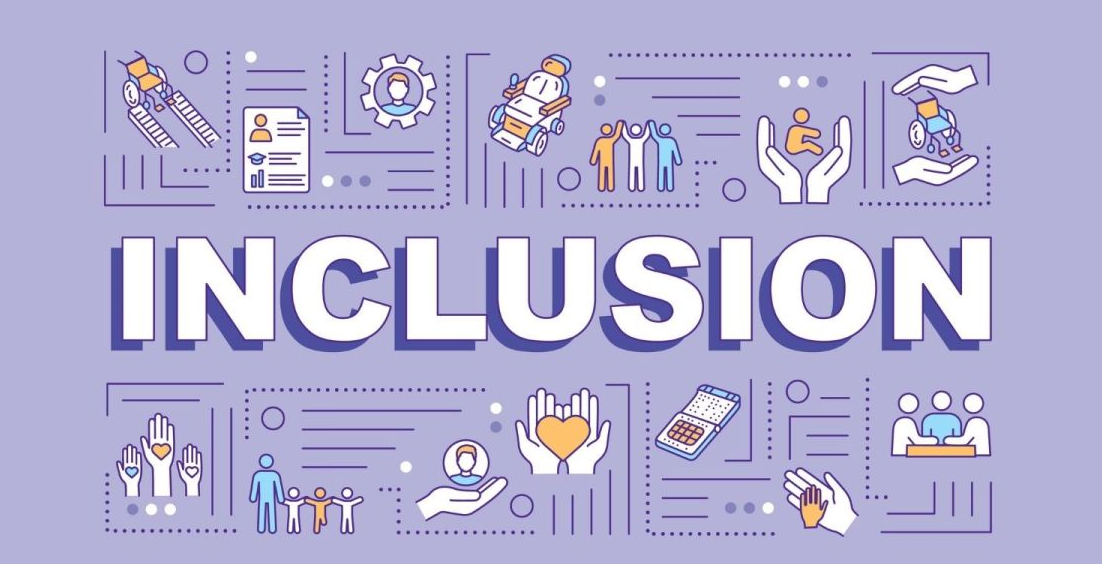
Source: Built in
Open and Inclusive Environment
Creating an open and inclusive environment is a fundamental principle within servant leadership that plays a pivotal role in guiding organizations through the complexities of digital transformation. This principle involves fostering a culture where team members feel empowered to express their ideas, concerns, and perspectives freely, leading to better collaboration and innovation.
1. Psychological Safety: Servant leaders prioritize psychological safety, ensuring that team members feel comfortable sharing their thoughts without fear of criticism or reprisal.
2. Diverse Perspectives: Leaders recognize the value of diverse perspectives and actively seek input from team members with varying backgrounds, skills, and experiences.
3. Active Listening: Servant leaders practice active listening, giving full attention to team members’ input, asking clarifying questions, and demonstrating empathy.
4. Encouraging Questions: Leaders encourage team members to ask questions, fostering a culture where curiosity is valued and information is sought after.
5. Respectful Dialogue: Servant leaders promote respectful dialogue and constructive feedback, setting the tone for open discussions and collaborative problem-solving.
6. Conflict Resolution: Leaders address conflicts and disagreements in a constructive manner, encouraging healthy debate while maintaining a focus on finding solutions.
7. Empowering Quiet Voices: Servant leaders create space for introverted team members to contribute, ensuring that everyone’s voice is heard, not just the most vocal ones.
8. Inclusive Decision-Making: Leaders involve team members in decision-making processes, ensuring that decisions are well-informed and representative of diverse viewpoints.

Source: AIHR
Impact on IT Transformation
Creating an open and inclusive environment has significant implications for successful IT transformation:
• Enhanced Collaboration: An inclusive culture fosters collaboration among team members with different expertise, leading to richer insights and more effective solutions.
• Innovation: Diverse perspectives and open discussions spark innovative thinking, resulting in creative solutions to the challenges of digital transformation.
• Employee Engagement: When team members’ voices are valued and heard, they become more engaged and motivated to contribute their best efforts.
• Better Problem-Solving: An environment where diverse viewpoints are welcomed leads to more comprehensive problem-solving and holistic decision-making.
• Reduced Silos: Open communication and inclusivity break down departmental silos, facilitating cross-functional collaboration crucial for digital transformation.
• Adaptability: Inclusive environments enable teams to adapt quickly to changes, as various viewpoints contribute to a better understanding of evolving circumstances.
In summary, servant leaders who emphasize creating an open and inclusive environment cultivate a culture of collaboration, innovation, and mutual respect. This approach not only facilitates smoother digital transformation but also nurtures a dynamic, agile, and cohesive organization prepared to tackle the challenges and opportunities of the digital age.

Source: Quixy
Cross-Functional Collaboration
Cross-functional collaboration is a vital principle within servant leadership that plays a significant role in guiding organizations through the intricacies of digital transformation. This principle involves fostering a culture where team members from different departments and disciplines work together, leveraging their unique expertise to achieve shared digital transformation goals.
1. Breaking Silos: Servant leaders actively break down departmental silos and encourage open communication and interaction among teams that traditionally work in isolation.
2. Shared Objectives: Leaders ensure that cross-functional teams have clear and shared objectives related to the digital transformation, aligning their efforts towards common goals.
3. Diverse Expertise: Servant leaders recognize the value of diverse expertise and skill sets from various departments, contributing to well-rounded and comprehensive solutions.
4. Collaborative Problem-Solving: Leaders encourage cross-functional teams to collectively address challenges, encouraging them to bring together their unique viewpoints to find solutions.
5. Knowledge Sharing: Servant leaders facilitate knowledge sharing sessions where team members can educate one another on their respective areas of expertise.
6. Joint Accountability: Leaders foster a sense of joint accountability within cross-functional teams, emphasizing that their collective success is essential for the transformation’s success.
7. Effective Communication: Servant leaders establish communication channels that facilitate easy information sharing between different departments, reducing communication gaps.
8. Celebration of Success: Leaders celebrate cross-functional achievements, highlighting how collaborative efforts have contributed to the organization’s digital transformation journey.
Impact on IT Transformation
Cross-functional collaboration has significant implications for successful IT transformation:
• Holistic Solutions: Collaboration among diverse experts results in well-rounded and comprehensive solutions to complex challenges posed by digital transformation.
• Efficient Problem-Solving: Combining different perspectives speeds up problem-solving by drawing on a variety of insights and experiences.
• Breakthrough Innovations: Cross-functional collaboration encourages creative thinking and the fusion of ideas, leading to breakthrough innovations.
• Alignment and Understanding: Collaboration enhances alignment between departments, ensuring that everyone understands how their contributions fit into the bigger picture.
• Reduced Duplication: When departments collaborate, duplication of effort is minimized, leading to a more efficient allocation of resources.
• Change Management: Collaborative cross-functional teams can better manage change by collectively addressing concerns and finding solutions.
Servant leaders who emphasize cross-functional collaboration create an environment of synergy, innovation, and shared responsibility. This approach not only facilitates smoother digital transformation but also nurtures a culture of unity, adaptability, and mutual support across the organization.

Shared Accountability
Shared accountability is a key principle within servant leadership that plays a critical role in guiding organizations through the complexities of digital transformation. This principle involves fostering a culture where team members collectively take responsibility for the success of the digital transformation journey, ensuring that everyone contributes to achieving the organization’s goals.
1. Collaborative Goal Setting: Servant leaders facilitate collaborative goal-setting sessions where team members collectively define transformation objectives, ensuring shared ownership.
2. Mutual Commitment: Leaders encourage team members to commit to the transformation’s success, emphasizing that their contributions are essential to achieving positive outcomes.
3. Transparent Communication: Servant leaders maintain transparent communication about the progress of the transformation, keeping team members informed about successes and challenges.
4. Clear Roles and Expectations: Leaders ensure that team members understand their roles, responsibilities, and how their individual efforts contribute to the overall transformation.
5. Problem-Solving as a Team: Servant leaders encourage collective problem-solving, fostering an environment where team members collaborate to address obstacles and find solutions.
6. Learning from Setbacks: Leaders promote a culture where setbacks are viewed as learning opportunities, and the team collectively identifies lessons to improve future efforts.
7. Peer Support: Servant leaders foster an environment where team members support each other, sharing knowledge and assisting whenever challenges arise.
8. Recognition of Collective Efforts: Leaders celebrate the collective achievements of the team, highlighting that successful transformation is the result of a combined effort.
Impact on IT Transformation
Shared accountability has significant implications for successful IT transformation:
• Motivation: Team members who share accountability are more motivated to contribute their best efforts, as they understand their role in achieving shared goals.
• Stronger Collaboration: Shared accountability promotes collaboration and a sense of camaraderie, leading to more effective cross-functional teamwork.
• Problem-Solving Agility: Collaborative problem-solving becomes more agile, as team members pool their expertise to address challenges efficiently.
• Innovation: A collective sense of accountability encourages team members to think creatively and contribute innovative solutions to transformation challenges.
• Sustainable Change: When everyone is accountable for the transformation’s success, the culture of accountability continues even after the transformation is complete.
• Adaptability: Shared accountability facilitates adaptability, as team members work together to address emerging challenges and changes.
In summary, servant leaders who emphasize shared accountability create an environment of collective responsibility, collaboration, and resilience. This approach not only facilitates smoother digital transformation but also nurtures a culture of commitment, adaptability, and continuous improvement within the organization.
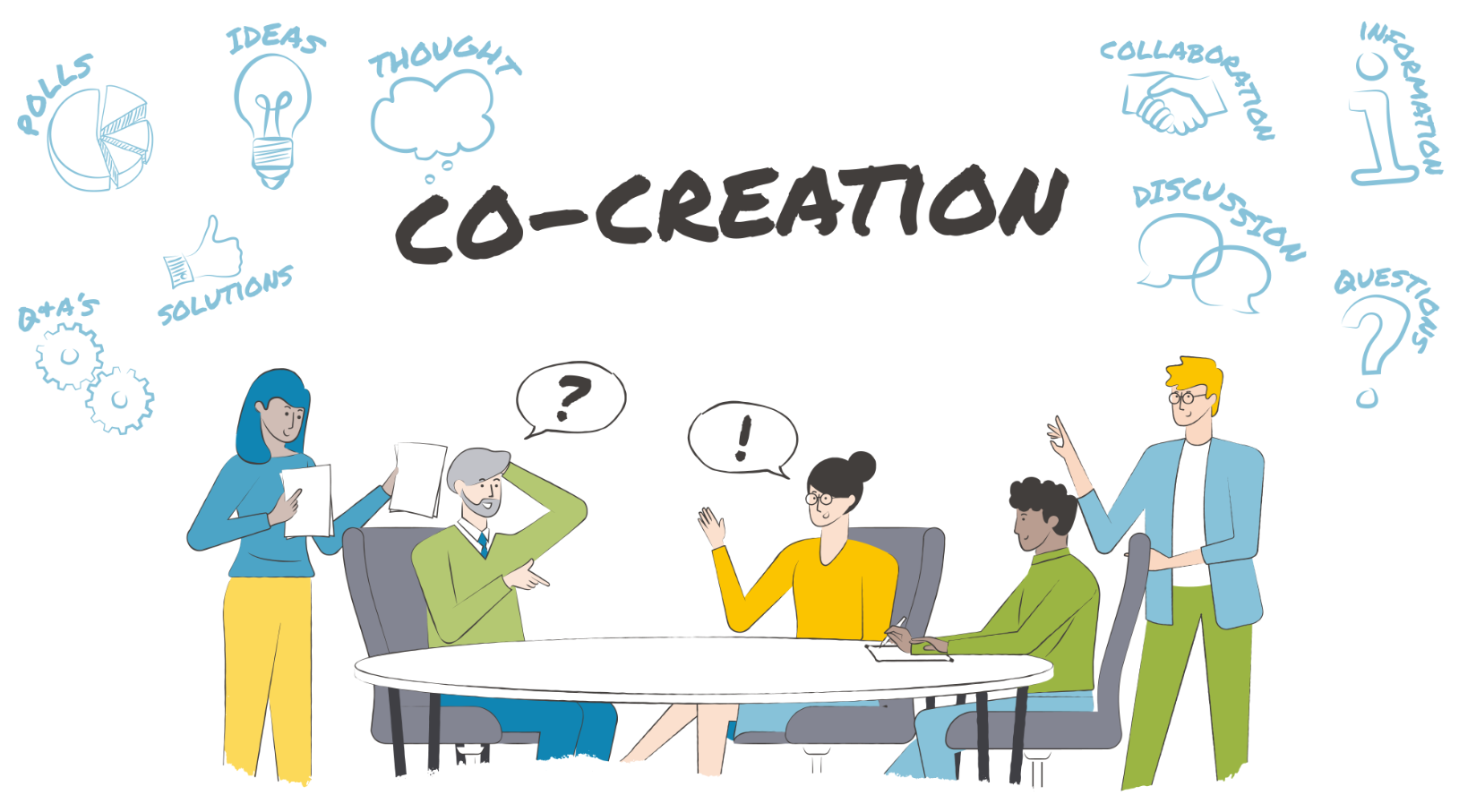
Source: Ultimate water
Co-Creation
Co-creation is a pivotal principle within servant leadership that plays a significant role in guiding organizations through the intricacies of digital transformation. This principle involves fostering a culture where team members actively participate in the creation and refinement of strategies, solutions, and initiatives related to the digital transformation journey.
1. Collaborative Ideation: Servant leaders encourage team members to collectively generate ideas, allowing diverse perspectives to contribute to the brainstorming process.
2. Inclusive Decision-Making: Leaders involve team members in decision-making processes, seeking input and feedback to ensure that choices are well-informed and representative.
3. Workshop and Design Thinking: Servant leaders organize workshops and design thinking sessions, where cross-functional teams collaboratively design innovative solutions.
4. Iterative Refinement: Leaders promote an iterative approach to co-creation, where solutions are continuously refined based on feedback and insights from team members.
5. Cross-Functional Teams: Servant leaders assemble cross-functional teams to co-create solutions, leveraging diverse expertise and experiences for holistic outcomes.
6. Ownership of Solutions: Leaders empower team members by allowing them to take ownership of the solutions they co-create, leading to higher commitment and dedication.
7. Feedback Integration: Servant leaders ensure that feedback from team members is integrated into the co-creation process, demonstrating that their input is valued.
8. Problem-Solving Diversity: Leaders recognize that co-creation leads to a diverse range of problem-solving approaches, contributing to well-rounded solutions.
Impact on IT Transformation
Co-creation has significant implications for successful IT transformation:
• Innovative Solutions: Co-created solutions benefit from diverse perspectives, resulting in innovative and effective approaches to transformation challenges.
• Ownership and Commitment: Team members who co-create solutions feel a sense of ownership and commitment to their success, driving higher levels of engagement.
• Collaboration: Co-creation fosters a culture of collaboration, as team members work together to achieve common transformation objectives.
• Adaptability: Solutions co-created by diverse experts are more adaptable to changing circumstances, as they encompass a wider range of insights.
• Empowerment: Co-creation empowers team members to contribute to the transformation’s success, increasing their sense of value and impact.
• Enhanced Communication: Co-creation promotes open and effective communication between team members, breaking down communication barriers.
In summary, servant leaders who emphasize co-creation create an environment of collaboration, innovation, and empowerment. This approach not only facilitates smoother digital transformation but also nurtures a culture of shared ownership, continuous improvement, and collective dedication to the organization’s transformational goals.

Source: LinkedIn
Skill Development
Skill development is a crucial principle within servant leadership that plays a significant role in guiding organizations through the complexities of digital transformation. This principle involves fostering a culture where team members are supported and encouraged to enhance their skills, knowledge, and expertise to effectively contribute to the organization’s digital transformation journey.
1. Identifying Development Needs: Servant leaders engage in conversations with team members to identify their existing skills and areas for growth relevant to the transformation goals.
2. Personalized Learning Plans: Leaders work with team members to create personalized learning plans that align with both their individual career aspirations and the organization’s needs.
3. Training and Workshops: Servant leaders provide access to training, workshops, and resources that enable team members to acquire new skills and stay updated on relevant technologies.
4. Mentorship and Coaching: Leaders offer mentorship and coaching, pairing experienced team members with those seeking guidance to facilitate skill transfer and development.
5. On-the-Job Learning: Servant leaders encourage learning through hands-on experience, allowing team members to apply newly acquired skills in real-world situations.
6. Feedback and Improvement: Leaders provide constructive feedback to help team members enhance their skills and encourage a growth mindset.
7. Continuous Learning Culture: Servant leaders foster a culture of continuous learning, emphasizing that skill development is an ongoing journey rather than a one-time event.
8. Recognizing Growth: Leaders recognize and celebrate team members’ skill development achievements, reinforcing the importance of learning and growth.
Impact on IT Transformation
Skill development has significant implications for successful IT transformation:
• Adaptability: Team members with developed skills are better equipped to adapt to new technologies and changing circumstances during the transformation.
• Innovation: Enhanced skills empower team members to contribute innovative solutions to transformation challenges and stay ahead in a dynamic digital landscape.
• Collaboration: Team members with diverse skill sets can collaborate more effectively, combining their expertise for comprehensive solutions.
• Employee Retention: A focus on skill development shows team members that the organization values their growth, leading to higher employee satisfaction and retention.
• Performance Enhancement: Enhanced skills lead to improved performance, efficiency, and effectiveness in carrying out transformation-related tasks.
• Leadership Pipeline: Skill development prepares team members for greater responsibilities and leadership roles within the organization.
Servant leaders who emphasize skill development create an environment of continuous improvement, empowerment, and growth. This approach not only facilitates smoother digital transformation but also nurtures a culture of innovation, adaptability, and professional development within the organization.

Risk-Taking
Risk-taking is a critical principle within servant leadership that plays a significant role in guiding organizations through the complexities of IT transformation. This principle involves fostering a culture where team members are encouraged to take calculated risks, explore new possibilities, and embrace innovation to drive the organization’s IT transformation journey.
1. Safe-to-Fail Mindset: Servant leaders cultivate a “safe-to-fail” mindset, where team members are empowered to take risks knowing that failures are opportunities for learning and growth.
2. Risk Assessment: Leaders guide team members in assessing risks by analyzing potential benefits, drawbacks, and consequences before making decisions.
3. Encouraging Experimentation: Servant leaders encourage experimentation and exploration of new ideas, technologies, and strategies to discover innovative solutions.
4. Learning from Failures: Leaders emphasize the importance of learning from failures, extracting insights that contribute to better decision-making and future successes.
5. Risk Management: Servant leaders ensure that risks are managed effectively by providing support, resources, and contingencies to mitigate potential negative outcomes.
6. Informed Decision-Making: Leaders empower team members to make informed decisions by providing relevant information and context related to the risks involved.
7. Celebrating Courage: Servant leaders celebrate team members who take calculated risks, recognizing their courage and initiative in contributing to the transformation journey.
8. Feedback Loop: Leaders establish a feedback loop where the outcomes of risk-taking are evaluated, discussed, and used to inform future risk assessments.
Impact on IT Transformation
Embracing risk-taking has significant implications for successful IT transformation:
• Innovation and Creativity: A culture of risk-taking fosters innovative thinking, encouraging team members to explore unconventional solutions and approaches.
• Adaptability: Teams that take risks are more adaptable to change, as they are accustomed to navigating uncertainties and learning from setbacks.
• Continuous Improvement: Learning from failures leads to continuous improvement, as insights gained from risks contribute to refining strategies and processes.
• Competitive Advantage: Organizations that take calculated risks can gain a competitive advantage by adopting emerging technologies and trends.
• Employee Empowerment: Encouraging risk-taking empowers team members, boosting their confidence and motivation to actively contribute to the transformation.
• Cultural Shift: A willingness to take risks signals a cultural shift towards innovation and resilience, crucial in the digital age.
In summary, servant leaders who emphasize risk-taking create an environment of innovation, empowerment, and adaptability. This approach not only facilitates smoother digital transformation but also nurtures a culture of creativity, learning, and continuous exploration within the organization.

Case Study Toyota Production System
Company Background: Toyota Production System (TPS), often referred to as Lean Manufacturing, is a renowned management philosophy and production system developed by Toyota. It is based on principles that emphasize continuous improvement, employee empowerment, and collaboration.
Empowerment and Collaboration in Servant Leadership:
Scenario: Taiichi Ohno, the father of the Toyota Production System, exemplified servant leadership principles through his emphasis on empowering and collaborating with employees.
1. Empowerment: Ohno believed in empowering employees to make decisions and take ownership of their work. He introduced the concept of “jidoka,” which empowers workers to stop the production line if they detect any defects or abnormalities. This empowered employees to contribute to quality improvement directly.
2. Collaboration: Ohno fostered a culture of collaboration by breaking down silos between different departments and roles. Cross-functional teams were formed to solve problems and make decisions collectively.
3. Continuous Improvement: Empowered employees were encouraged to suggest improvements and innovative solutions to enhance processes. Ohno believed that those closest to the work were best positioned to identify inefficiencies and propose effective changes.
4. Learning through Problem-Solving: Ohno promoted the concept of “kaizen,” which involves incremental improvements through continuous problem-solving. Employees were given the autonomy to identify problems and collaboratively find solutions.
5. Coaching Leadership: Ohno’s approach was that of a coach. He guided employees by asking questions, encouraging critical thinking, and facilitating their learning and growth.
Impact:
Toyota’s emphasis on empowerment and collaboration through servant leadership principles had several positive outcomes:
• Employee Engagement: Empowered employees were more engaged, as they felt valued and trusted by the organization.
• Innovation: Collaboration and empowerment led to a culture of innovation, where employees actively contributed ideas for improvement.
• Efficiency: The collaborative problem-solving approach resulted in streamlined processes and reduced waste.
• Adaptability: Empowered employees were better equipped to adapt to changes and contribute to the organization’s evolution.
• Sustainability: The principles of empowerment and collaboration contributed to Toyota’s long-term success and reputation for quality.
In conclusion, the case of Toyota Production System illustrates how empowerment and collaboration, as fundamental aspects of servant leadership, can lead to an organization’s transformational success. Taiichi Ohno’s approach empowered employees to take ownership of their work, collaborate across functions, and continuously improve processes. This not only resulted in remarkable operational efficiencies but also laid the foundation for Toyota’s reputation as a pioneer in lean manufacturing and servant leadership.

Course Manual 4: Support for Learning and Development
Within the framework of IT transformation, championing learning and development emerges as a pivotal facet of servant leadership. This entails fostering an environment characterized by perpetual learning, furnishing tools to bolster skills, and granting employees the empowerment to amass the essential knowledge requisite for adeptly traversing the landscape of technological shifts.
Identifying Skill Gaps
Identifying skill gaps is a crucial step within servant leadership that plays a significant role in guiding organizations through the complexities of IT transformation. This process involves recognizing areas where team members’ skills and expertise may not align with the requirements of the IT transformation journey.
1. Skill Assessment: Servant leaders conduct skill assessments to evaluate the current skills and competencies of team members in relation to the organization’s digital transformation goals.
2. Mapping to Transformation Needs: Leaders map the existing skills of team members to the specific skills and competencies required to successfully execute the digital transformation initiatives.
3. Identifying Emerging Trends: Servant leaders stay informed about emerging technologies, trends, and industry shifts to anticipate the skills that will be in demand during the transformation.
4. Gap Analysis: Leaders conduct a gap analysis to identify discrepancies between the current skill levels and the skills needed for effective participation in the transformation.
5. Consulting with Team Members: Servant leaders engage in conversations with team members to understand their own perceptions of their skills, aspirations, and areas for growth.
6. Cross-Functional Insights: Leaders collaborate with various departments and teams to gather insights about skill needs across the organization.
7. Feedback from Stakeholders: Servant leaders gather feedback from stakeholders, clients, and partners to ensure that team members possess the skills needed to meet external expectations.
8. Data-Driven Approach: Leaders utilize data analytics to gain insights into skill gaps and trends, aiding in informed decision-making.
Impact on IT Transformation
Identifying skill gaps has significant implications for successful IT transformation:
• Strategic Resource Allocation: Identifying skill gaps enables leaders to allocate resources effectively for training, upskilling, and reskilling initiatives.
• Focused Learning: Targeted skill gap identification ensures that learning efforts are focused on the areas most critical for the transformation’s success.
• Preparedness: Addressing skill gaps prepares team members to face challenges posed by new technologies and digital tools.
• Enhanced Collaboration: Teams with complementary skill sets collaborate more effectively, resulting in holistic and comprehensive solutions.
• Reduced Skill Shortages: Proactively addressing skill gaps helps prevent shortages in critical areas, ensuring smooth execution of transformation projects.
• Empowerment: Team members appreciate the organization’s investment in their growth, leading to higher motivation and empowerment.
This approach not only facilitates smoother digital transformation but also nurtures a culture of continuous improvement, adaptability, and alignment between the organization’s goals and the skills of its workforce.

Source: Center for Creative Leadership
Creating a Learning Culture
Creating a learning culture is a foundational principle within servant leadership that plays a significant role in guiding organizations through the complexities of IT transformation. This principle involves fostering an environment where continuous learning is not only encouraged but ingrained as a core value across all levels of the organization.
1. Leading by Example: Servant leaders demonstrate a commitment to learning by actively participating in training, workshops, and continuous skill enhancement themselves.
2. Communication of Importance: Leaders communicate the importance of learning as a strategic imperative for the organization’s growth and success during the transformation.
3. Encouraging Curiosity: Servant leaders encourage team members to be curious, ask questions, and seek opportunities for learning and self-improvement.
4. Learning Resources: Leaders provide access to a variety of learning resources such as online courses, workshops, webinars, and educational materials.
5. Structured Learning Paths: Servant leaders create structured learning paths or development plans that guide team members on how to acquire new skills and knowledge.
6. Time for Learning: Leaders allocate time for learning activities, ensuring that team members have dedicated periods for skill enhancement without compromising their core responsibilities.
7. Rewarding Learning Efforts: Servant leaders recognize and reward team members who actively engage in learning and demonstrate a commitment to self-improvement.
8. Feedback and Reflection: Leaders encourage team members to reflect on their learning experiences and provide feedback on the effectiveness of learning programs.
Impact on IT Transformation
Creating a learning culture has significant implications for successful IT transformation:
• Agility: A learning culture promotes adaptability, enabling team members to quickly acquire new skills and respond to emerging challenges.
• Innovation: Continuous learning fosters innovative thinking, as team members are exposed to new ideas, technologies, and approaches.
• Retention of Talent: Organizations with a learning culture are more likely to retain top talent, as employees value opportunities for growth and development.
• Knowledge Sharing: A learning culture encourages the sharing of knowledge and expertise among team members, enhancing collaboration and problem-solving.
• Skill Upgradation: Team members proactively enhance their skills, reducing skill gaps and ensuring they remain relevant in the evolving digital landscape.
• Change Management: A learning culture eases the process of change management, as team members are more receptive to new tools and technologies.
This approach not only facilitates smoother digital transformation but also nurtures a culture of continuous improvement, adaptability, and empowerment within the organization.

Training Opportunities
Providing training opportunities is a critical principle within servant leadership that plays a significant role in guiding organizations through the intricacies of digital transformation. This principle involves offering structured training programs, workshops, and learning experiences that equip team members with the skills and knowledge needed to thrive in the digital age.
1. Needs Assessment: Servant leaders conduct thorough needs assessments to identify the specific training needs of individual team members and the organization as a whole.
2. Curating Relevant Content: Leaders curate or provide access to training content that is directly aligned with the skills required for the successful execution of digital transformation initiatives.

Source: AIHR
3. Blended Learning Approaches: Servant leaders utilize a blend of learning approaches, including in-person workshops, online courses, webinars, and hands-on exercises.
4. External Partnerships: Leaders may partner with external training providers or experts to bring specialized knowledge and insights to the organization.
5. On-Demand Learning: Servant leaders enable team members to access learning resources on-demand, allowing them to learn at their own pace and convenience.
6. Customized Training Plans: Leaders work with individual team members to develop customized training plans that align with their career goals and the organization’s needs.
7. Continuous Learning Initiatives: Servant leaders establish ongoing learning initiatives, ensuring that skill development is a continuous and evolving process.
8. Measuring Learning Outcomes: Leaders assess the effectiveness of training programs by measuring learning outcomes, such as improved skills, performance, and confidence.
Impact on IT Transformation
Providing training opportunities has significant implications for successful IT transformation:
• Skill Enhancement: Training opportunities equip team members with the skills needed to effectively contribute to digital transformation initiatives.
• Knowledge Dissemination: Learning experiences facilitate the dissemination of knowledge and best practices across the organization.
• Change Adoption: Well-trained team members are more likely to adopt new tools, technologies, and processes introduced during the transformation.
• Innovation: Training exposes team members to new ideas and trends, fostering innovative thinking and creative problem-solving.
• Employee Engagement: Providing learning opportunities demonstrates the organization’s investment in its employees, leading to higher engagement and job satisfaction.
• Talent Attraction and Retention: Organizations offering robust training opportunities are more attractive to potential hires and are better equipped to retain top talent.
In summary, servant leaders who emphasize providing training opportunities create an environment of growth, adaptability, and continuous improvement. This approach not only facilitates smoother digital transformation but also nurtures a culture of empowerment, learning, and professional development within the organization.

Personalized Development Plans
Personalized development plans are a crucial principle within servant leadership that plays a significant role in guiding organizations through the complexities of digital transformation. This principle involves tailoring individualized learning paths for team members that align with their unique skills, career aspirations, and the organization’s digital transformation goals.

Source: Eventus Recruitment Group
1. Individual Assessment: Servant leaders conduct individual assessments to understand each team member’s strengths, areas for growth, and career aspirations.
2. Goal Alignment: Leaders align personal development goals with the organization’s digital transformation objectives, ensuring a clear connection between individual growth and organizational success.
3. Collaborative Planning: Servant leaders collaborate with team members to co-create personalized development plans, taking into account their input and preferences.
4. Skill Enhancement: Leaders identify specific skills that need enhancement or acquisition for effective participation in the digital transformation.
5. Resource Identification: Servant leaders help team members identify relevant resources such as courses, workshops, online materials, and mentorship opportunities.
6. Progress Tracking: Leaders set milestones and checkpoints within the development plan to track progress and provide ongoing feedback.
7. Flexible Adaptation: Servant leaders recognize that development plans may need adjustments as circumstances change, allowing for flexibility in the learning journey.
8. Empowerment: Leaders empower team members by giving them ownership of their development, fostering a sense of accountability and commitment.
Impact on IT Transformation
Personalized development plans have significant implications for successful IT transformation:
• Targeted Skill Development: Personalized plans ensure that team members acquire the specific skills required for their roles within the digital transformation journey.
• Enhanced Engagement: Team members feel more engaged and valued when their personal growth is aligned with the organization’s goals.
• Adaptability: Development plans equip team members with skills that enable them to adapt to the evolving demands of digital transformation.
• Talent Retention: Organizations that invest in individualized development are more likely to retain top talent, as team members appreciate growth opportunities.
• Leadership Pipeline: Personalized plans prepare team members for greater responsibilities and leadership roles within the organization.

Source: FourWeekMBA
• Cohesive Team: Team members with customized development plans contribute to a well-rounded and cohesive team with diverse skill sets.
Servant leaders who emphasize personalized development plans create an environment of empowerment, growth, and alignment. This approach not only facilitates smoother digital transformation but also nurtures a culture of continuous learning, individualized progress, and collective success within the organization.

Skill Diversification
Skill diversification is a critical principle within servant leadership that plays a significant role in guiding organizations through the complexities of digital transformation. This principle involves encouraging team members to acquire a diverse range of skills beyond their core expertise, enabling them to contribute effectively to various aspects of the digital transformation journey.
1. Identifying Skill Gaps: Servant leaders identify skill gaps in team members and areas where diversification can enhance their overall contributions to the organization’s transformation goals.
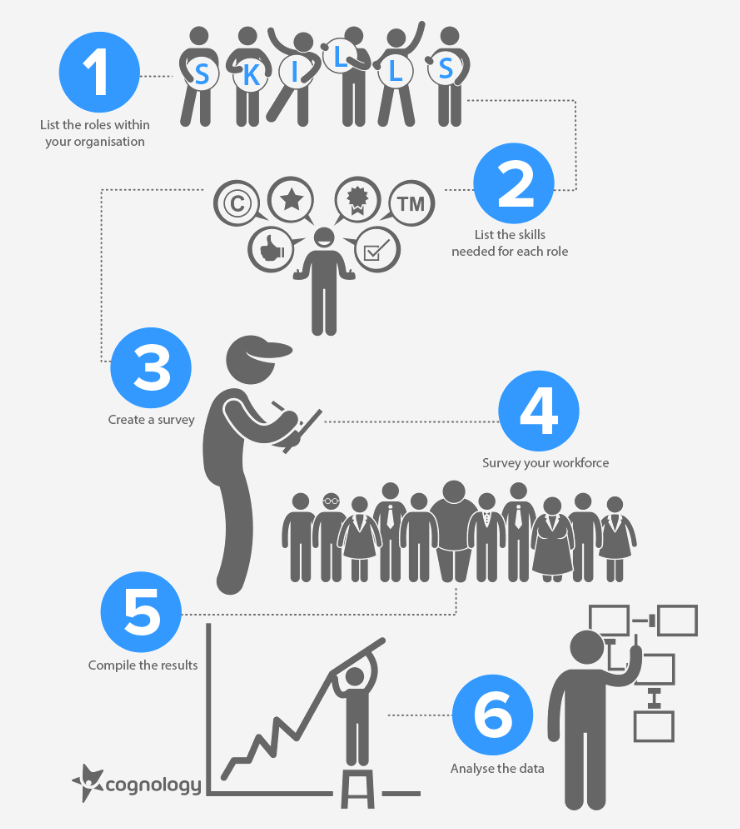
Source: Cognology
2. Exploring Related Fields: Leaders encourage team members to explore skills that are related or complementary to their existing expertise, broadening their knowledge base.
3. Cross-Functional Exposure: Servant leaders promote cross-functional exposure, allowing team members to work with colleagues from different departments and learn from their skill sets.
4. Skill Transfer: Leaders facilitate skill transfer workshops, where team members share their expertise with others and learn new skills in return.
5. Rotational Assignments: Servant leaders offer opportunities for team members to take on temporary assignments in different roles, allowing them to gain new skills.
6. Adaptive Learning: Leaders emphasize the importance of being adaptable by learning skills that are relevant to emerging technologies and industry trends.
7. Multi-Disciplinary Teams: Servant leaders assemble multi-disciplinary teams that collectively possess a wide range of skills, leading to comprehensive problem-solving.
8. Celebrating Diversified Skills: Leaders celebrate team members who embrace skill diversification, highlighting their commitment to personal and organizational growth.
Impact on IT Transformation
Skill diversification has significant implications for successful IT transformation:
• Holistic Problem-Solving: Team members with diverse skills approach challenges from various angles, leading to more comprehensive and innovative solutions.
• Agility and Adaptability: Diversified skills make team members more adaptable to changes in technology and market demands, enhancing the organization’s agility.
• Innovation: Exposure to various skills sparks innovative thinking as team members draw on different knowledge areas to generate new ideas.
• Collaboration: Diversified skills promote collaboration, as team members from different backgrounds work together harmoniously.

Source: Institute for Collaborative Working
• Reduced Skill Gaps: Skill diversification helps address skill gaps, ensuring that team members have a broader skill set to contribute effectively.
• Professional Development: Learning new skills enhances team members’ professional development, boosting their career prospects.
In summary, servant leaders who emphasize skill diversification create an environment of innovation, collaboration, and adaptability. This approach not only facilitates smoother digital transformation but also nurtures a culture of continuous learning, skill enhancement, and collective success within the organization.
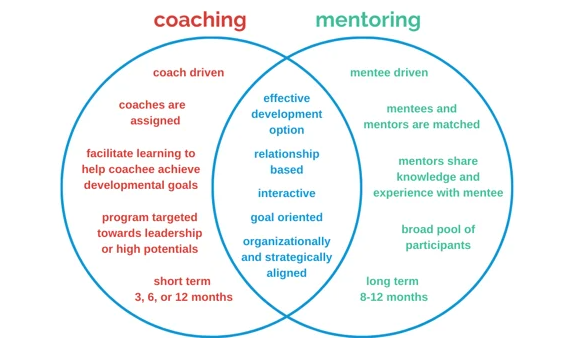
Source: Insala
Mentorship and Coaching
Mentorship and coaching are fundamental principles within servant leadership that play a significant role in guiding organizations through the complexities of digital transformation. This principle involves providing guidance, support, and personalized feedback to team members, enabling them to navigate the challenges of the transformation journey effectively.
1. Identifying Mentors: Servant leaders identify experienced individuals within the organization who can serve as mentors to guide and support team members.
2. Coaching Relationships: Leaders establish coaching relationships, where team members have regular one-on-one sessions with mentors to discuss goals, challenges, and growth opportunities.
3. Skill Transfer: Servant leaders encourage mentors to share their expertise, enabling team members to acquire new skills and knowledge through hands-on learning.
4. Personalized Guidance: Leaders ensure that coaching and mentorship are tailored to individual team members’ needs, aspirations, and learning styles.
5. Feedback and Reflection: Servant leaders facilitate feedback sessions, allowing team members to reflect on their progress, receive constructive input, and refine their approach.
6. Career Development: Leaders use mentorship and coaching to guide team members in shaping their career paths, aligning growth with the organization’s needs.
7. Problem-Solving Support: Servant leaders encourage mentors to help team members navigate challenges and find solutions by sharing insights and experiences.
8. Celebrating Growth: Leaders celebrate the growth and achievements of team members who have benefited from mentorship and coaching, fostering a culture of development.
Impact on IT Transformation
Mentorship and coaching have significant implications for successful IT transformation:
• Knowledge Transfer: Mentors pass on valuable insights and knowledge, expediting skill development and helping team members avoid common pitfalls.
• Confidence Building: Personalized guidance and feedback boost team members’ confidence, enabling them to take on more challenging roles and tasks.
• Adaptability: Mentors provide advice on navigating change and uncertainty, helping team members adapt to the evolving digital landscape.
• Leadership Development: Mentorship prepares team members for leadership roles, cultivating a pipeline of skilled leaders for the organization.
• Enhanced Problem-Solving: Team members benefit from mentors’ experiences, enhancing their ability to approach complex transformation challenges.
• Employee Retention: Organizations that invest in mentorship and coaching demonstrate their commitment to employee growth, leading to higher retention rates.

Source: NetSuite
Servant leaders who emphasize mentorship and coaching create an environment of growth, support, and personal development. This approach not only facilitates smoother digital transformation but also nurtures a culture of learning, collaboration, and empowerment within the organization.

Learning from Failures
Learning from failures is a pivotal principle within servant leadership that plays a significant role in guiding organizations through the intricacies of digital transformation. This principle involves fostering an environment where failures are viewed as opportunities for growth, and where team members are encouraged to analyze and extract insights from setbacks.
Cultivating a Safe Environment: Servant leaders create an atmosphere where team members feel safe to take calculated risks without fear of severe consequences for failures.
Open Discussion: Leaders encourage open and honest discussions about failures, facilitating the sharing of experiences and lessons learned.
Deconstructing Failures: Servant leaders guide team members in deconstructing failures, helping them identify root causes, contributing factors, and possible alternative approaches.
Positive Framing: Leaders frame failures as learning experiences, highlighting the valuable lessons that can be gained from setbacks.
Ownership and Accountability: Servant leaders encourage team members to take ownership of their failures, emphasizing the importance of accountability for growth.
Feedback Loop: Leaders establish a feedback loop where the insights gained from failures are used to inform future decisions and strategies.
Adapting Strategies: Servant leaders guide teams in adapting strategies based on lessons learned from failures, ensuring a more informed and resilient approach.
Celebrating Effort: Leaders celebrate the effort and initiative taken, even when outcomes are not as expected, fostering a culture of continuous improvement.
Impact on IT Transformation
Learning from failures has significant implications for successful IT transformation:
• Innovation: A culture of learning from failures encourages innovative thinking, as team members are willing to experiment with new ideas and approaches.
• Continuous Improvement: Analyzing failures leads to continuous improvement, as teams refine strategies and processes based on insights gained.
• Adaptability: Teams that learn from failures are more adaptable to change, as they have developed the skills to navigate uncertainty.
• Risk Management: Identifying and addressing the causes of failures contributes to better risk management in future transformation efforts.
• Resilience: Teams that learn from failures build resilience, as they are better equipped to handle challenges and setbacks.
• Knowledge Sharing: Sharing failure experiences and insights promotes knowledge sharing across the organization, preventing similar mistakes in the future.
In summary, servant leaders who emphasize learning from failures create an environment of innovation, resilience, and growth. This approach not only facilitates smoother digital transformation but also nurtures a culture of continuous learning, adaptation, and collective wisdom within the organization.

Celebrating Progress
Celebrating progress is a vital principle within servant leadership that plays a significant role in guiding organizations through the complexities of digital transformation. This principle involves acknowledging and recognizing the milestones, achievements, and efforts made by team members as they contribute to the organization’s digital transformation journey.
1. Recognition of Efforts: Servant leaders actively recognize and acknowledge the hard work, dedication, and commitment shown by team members at various stages of the transformation.
2. Regular Communication: Leaders maintain open communication channels to share successes, milestones, and positive outcomes achieved during the transformation process.
3. Public Acknowledgment: Servant leaders publicly acknowledge and appreciate team members’ contributions, whether through team meetings, company-wide announcements, or other platforms.
4. Personalized Recognition: Leaders provide personalized recognition that resonates with each team member’s contributions, ensuring that efforts are acknowledged on an individual level.
5. Tangible Rewards: Servant leaders offer tangible rewards such as awards, certificates, bonuses, or other incentives to celebrate significant achievements and milestones.
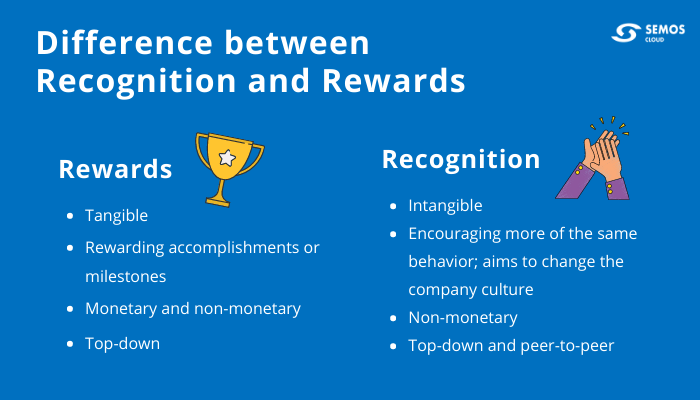
Source: Semos Cloud
6. Learning from Success: Leaders facilitate discussions on the factors that led to successful outcomes, encouraging the team to replicate effective practices in the future.
7. Shared Accomplishments: Servant leaders emphasize that accomplishments are a result of collective effort, reinforcing the importance of collaboration and teamwork.
8. Creating a Positive Atmosphere: Leaders foster a positive and motivating atmosphere by celebrating progress, boosting team morale and motivation.
Impact on IT Transformation
Celebrating progress has significant implications for successful IT transformation:
• Motivation: Recognizing progress boosts team members’ motivation and sense of accomplishment, encouraging continued dedication to the transformation journey.

Source: Institute of Entrepreneurship Development
• Positive Culture: Regular celebrations contribute to a positive organizational culture, where team members feel valued and appreciated.
• Persistence: Celebrating progress helps maintain momentum and perseverance during challenging phases of the transformation.
• Retention: Teams that feel recognized and valued are more likely to stay committed to the organization, reducing turnover rates.
• Innovation: Recognizing innovative solutions and successful outcomes encourages a culture of innovation and creativity.
• Collaboration: Celebrating progress fosters a sense of unity and collaboration among team members, leading to better synergy in teamwork.
Servant leaders who emphasize celebrating progress create an environment of positivity, motivation, and unity. This approach not only facilitates smoother digital transformation but also nurtures a culture of achievement, collaboration, and collective success within the organization.

Case Study: Microsoft’s Learning and Development Initiatives
Company Background: Microsoft Corporation, a global technology giant, has emphasized learning and development as a core component of its corporate culture. This case study focuses on the tenure of Satya Nadella as CEO and his servant leadership approach to fostering employee growth.
Support for Learning and Development in Servant Leadership:
Scenario: Satya Nadella, who became CEO of Microsoft in 2014, implemented servant leadership principles by prioritizing employee learning and development.
1. Learning Culture: Nadella focused on cultivating a learning culture within Microsoft. He emphasized that a company’s ability to learn and adapt is a key driver of success, especially in the rapidly changing technology landscape.
2. Empowerment for Growth: Nadella supported employees’ pursuit of continuous learning. He encouraged employees to take online courses, attend conferences, and engage in skill-building activities that aligned with their interests and career aspirations.
3. Transformational Leadership: Nadella’s leadership style was centred on empowering individuals to embrace change and develop new skills. He believed that a culture of continuous learning was pivotal in driving Microsoft’s transformation.
4. Diversity and Inclusion: Nadella championed diversity and inclusion efforts, recognizing that a diverse workforce contributes to a richer learning environment and promotes innovative thinking.
5. Redefining Performance Metrics: Under Nadella’s leadership, performance metrics shifted from measuring outputs to measuring employees’ growth mindset and their willingness to learn and adapt.
Impact:
Microsoft’s emphasis on support for learning and development through servant leadership principles had several positive outcomes:
• Employee Empowerment: Employees felt empowered to enhance their skills and knowledge, contributing to their personal and professional growth.
• Innovation: A culture of continuous learning fostered a dynamic environment where employees were better equipped to innovate and adapt to market changes.
• Talent Retention: The emphasis on learning and development contributed to higher employee satisfaction and retention rates.
• Agility: Microsoft’s ability to quickly adapt to technological shifts was enhanced by having a workforce that actively embraced new skills and knowledge.
• Adaptive Culture: The organization developed an adaptive culture that was open to change and willing to explore emerging technologies and ideas.
In conclusion, Microsoft’s approach to learning and development under Satya Nadella’s servant leadership demonstrates how investing in employee growth can drive organizational success. By supporting continuous learning and creating an environment that values skill development, leaders can transform their organizations into agile, innovative, and resilient entities that thrive in today’s ever-evolving business landscape.

Course Manual 5: Flexibility and Adaptability
Flexibility and adaptability stand as vital elements within servant leadership, assuming a central role in steering organizations through the intricate landscape of challenges and shifts brought about by IT transformation. These principles entail a willingness to embrace modifications, an openness to change, and the skill to navigate teams through periods of uncertainty.
Openness to Change
Openness to change is a fundamental principle within servant leadership that plays a significant role in guiding organizations through the complexities of IT transformation. This principle involves embracing change with a positive attitude, encouraging team members to be receptive to new ideas, methodologies, and strategies.
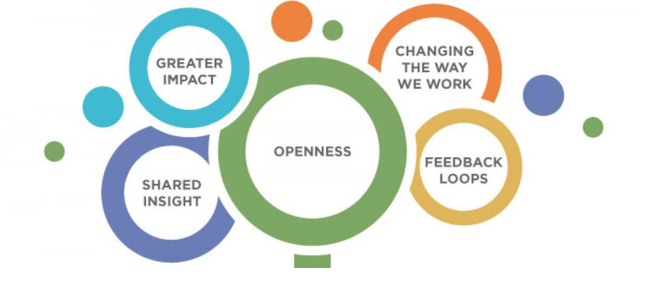
Source: Philanthropy Network Greater Philadelphia
1. Leading by Example: Servant leaders set the tone by demonstrating their own openness to change and their willingness to adapt to new circumstances.
2. Creating a Culture of Innovation: Leaders foster a culture where innovation and experimentation are celebrated, encouraging team members to seek out innovative solutions.
3. Listening to Feedback: Servant leaders actively listen to team members’ feedback, ideas, and concerns regarding changes, demonstrating that their opinions are valued.
4. Communication: Leaders communicate the reasons behind the changes and the potential benefits, helping team members understand the rationale and context.
5. Transparency: Servant leaders are transparent about the goals and objectives of the changes, reducing uncertainty and building trust.
6. Flexibility in Plans: Leaders are willing to adjust plans and strategies based on evolving circumstances, demonstrating a flexible approach.
7. Embracing Continuous Improvement: Servant leaders encourage a mindset of continuous improvement, promoting the idea that change is an ongoing process.

Source: LogRocket Blog
8. Addressing Resistance: Leaders address resistance to change by empathetically addressing concerns and providing information that alleviates uncertainty.
Impact on IT Transformation
Openness to change has significant implications for successful IT transformation:
• Adaptation: An open attitude to change enables teams to adapt swiftly to new technologies and evolving market dynamics.
• Innovation: Teams that are open to change are more likely to adopt innovative solutions and explore new opportunities.
• Efficiency: Embracing changes in processes and tools can lead to increased efficiency and productivity.
• Collaboration: A culture of openness fosters better collaboration as team members are more receptive to diverse ideas and perspectives.
• Agility: Organizations that embrace change are more agile, capable of responding quickly to market shifts and emerging trends.
• Employee Engagement: Team members who feel that their input is valued in the change process are more engaged and invested in the transformation.
In summary, servant leaders who emphasize openness to change create an environment of innovation, adaptability, and growth. This approach not only facilitates smoother digital transformation but also nurtures a culture of continuous improvement, collaboration, and proactive response to the ever-evolving business landscape.

Responsive Decision-Making
Responsive decision-making is a crucial principle within servant leadership that plays a significant role in guiding organizations through the complexities of digital transformation. This principle involves making decisions that are agile, timely, and well-informed, ensuring that the organization can effectively navigate the dynamic landscape of digital changes.
1. Agile Approach: Servant leaders adopt an agile approach to decision-making, recognizing the need to respond quickly to changing circumstances.
2. Data-Informed Decisions: Leaders gather and analyze relevant data before making decisions, ensuring that choices are grounded in evidence rather than assumptions.

Source: Qlik
3. Inclusive Decision-Making: Servant leaders involve relevant stakeholders in the decision-making process, gathering diverse perspectives and insights.
4. Risk Evaluation: Leaders assess the potential risks and benefits of each decision, considering the potential impact on the organization’s goals.
5. Flexibility: Servant leaders are open to adjusting decisions based on new information or changing conditions, demonstrating adaptability.
6. Empowerment: Leaders empower team members by allowing them to participate in decision-making that affects their areas of expertise.
7. Clear Communication: Servant leaders communicate the rationale behind decisions to ensure team members understand the reasoning and objectives.
8. Learning from Decisions: Leaders encourage a learning mindset by reflecting on the outcomes of decisions, identifying lessons for future choices.
Impact on IT Transformation
Responsive decision-making has significant implications for successful IT transformation:
• Adaptation: Quick and well-informed decisions enable organizations to adapt rapidly to emerging technologies and market shifts.
• Efficiency: Agile decision-making prevents bottlenecks in the decision-making process, leading to smoother and more efficient transformations.
• Risk Mitigation: Evaluating risks and benefits helps organizations make informed decisions that mitigate potential negative impacts.

Source: MHA Consulting
• Engagement: Inclusive decision-making engages team members, as they feel their opinions are valued and considered.
• Innovation: Responsive decisions encourage innovation, as teams can experiment and innovate with the support of quick decision cycles.
• Alignment: Clear communication and involvement in decision-making help ensure that team members are aligned with the organization’s goals.
In conclusion, servant leaders who prioritize responsive decision-making establish an environment characterized by agility, collaboration, and well-informed progress. This approach not only facilitates the seamless execution of digital transformation but also cultivates a culture of adaptability, innovation, and shared ownership within the organization.

Source: Mooncamp
Agile Mindset
An agile mindset is a fundamental principle within servant leadership that plays a significant role in guiding organizations through the intricacies of digital transformation. This principle involves cultivating a mindset that embraces change, values flexibility, and encourages iterative approaches to problem-solving and innovation.
1. Embracing Change: Servant leaders encourage team members to view change as an opportunity for growth, emphasizing that change is a constant in the digital landscape.
2. Flexibility: Leaders emphasize the importance of being flexible in response to evolving circumstances, fostering the ability to adapt quickly.
3. Iterative Approach: Servant leaders promote an iterative approach to problem-solving and decision-making, where solutions are refined over time based on feedback and learning.
4. Rapid Experimentation: Leaders encourage teams to experiment with new ideas and technologies, enabling them to test hypotheses and learn from failures.
5. Continuous Learning: Servant leaders prioritize continuous learning, fostering a culture where team members seek opportunities to expand their knowledge.
6. Collaborative Adaptation: Leaders emphasize collaboration in adapting to changes, encouraging team members to contribute their diverse insights.
7. Fail-Fast Mentality: Servant leaders create an environment where failures are seen as learning opportunities, motivating teams to take calculated risks.
8. Customer-Centricity: Leaders instil a customer-centric approach, where changes are driven by feedback and needs identified from the customer’s perspective.
Impact on IT Transformation
An agile mindset has significant implications for successful IT transformation:
• Adaptability: Teams with an agile mindset can quickly adjust to technological shifts and market changes.
• Innovation: An agile mindset encourages innovative thinking, enabling teams to explore new solutions and approaches.
• Rapid Response: An agile approach allows organizations to respond swiftly to emerging opportunities and challenges.
• Risk Mitigation: The iterative nature of an agile mindset helps organizations identify and address risks early in the transformation journey.
• Employee Engagement: Team members feel empowered and engaged when they can contribute ideas and adapt to changes.
• Efficiency: Iterative problem-solving enhances the efficiency of processes and strategies over time.
In conclusion, leaders who prioritize cultivating an agile mindset create an environment characterized by adaptability, innovation, and resilience. This approach not only facilitates the smoother execution of digital transformation but also nurtures a culture of continuous improvement, collaboration, and proactive adaptation to the ever-evolving business landscape.
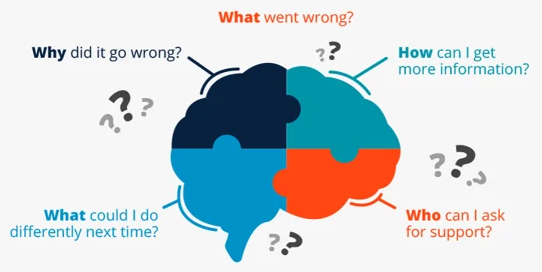
Source: Quadmark
Learning from Mistakes
Learning from mistakes is a critical principle within servant leadership that plays a significant role in guiding organizations through the complexities of digital transformation. This principle involves acknowledging that mistakes are valuable learning opportunities and encouraging team members to analyze failures to extract insights for improvement.
1. Psychological Safety: Servant leaders foster a psychological safe space where team members feel comfortable admitting mistakes without fear of blame or retribution.

Source: Millennial Executive
2. Deconstructing Mistakes: Leaders guide teams in deconstructing mistakes, examining root causes, decisions made, and factors contributing to the outcome.
3. Identifying Patterns: Servant leaders help teams identify recurring patterns in mistakes, enabling the organization to address underlying issues.
4. Ownership of Mistakes: Leaders encourage team members to take ownership of their mistakes, turning them into growth opportunities.
5. Sharing Lessons: Servant leaders promote the sharing of lessons learned from mistakes across the organization, preventing others from making the same errors.
6. Iterative Improvement: Leaders emphasize that mistakes are a part of the iterative improvement process, leading to enhanced strategies and practices.
7. Constructive Feedback: Servant leaders provide constructive feedback after mistakes, focusing on solutions and identifying steps for improvement.
8. Encouraging Risk-Taking: Leaders create an environment where calculated risks are encouraged, enabling innovation while understanding that not all risks will lead to success.

Source: Dyknow
Impact on IT Transformation
Learning from mistakes has significant implications for successful IT transformation:
• Continuous Improvement: Teams that learn from mistakes consistently refine their approach, leading to better strategies and outcomes.
• Innovation: Mistakes foster innovation by encouraging teams to explore new ideas and experiment with different approaches.
• Adaptability: Teams that learn from mistakes are better equipped to adapt to unforeseen challenges and changes in the digital landscape.
• Employee Development: Viewing mistakes as learning opportunities contributes to the professional growth of team members.
• Risk Management: Analyzing mistakes helps organizations identify potential risks and take proactive measures to mitigate them.
• Collaborative Culture: A culture that embraces learning from mistakes promotes collaboration as teams share insights and strategies.
In summary, servant leaders who emphasize learning from mistakes create an environment of growth, innovation, and resilience. This approach not only facilitates smoother digital transformation but also nurtures a culture of continuous learning, collaboration, and proactive problem-solving within the organization.

Adjusting Strategies
Adjusting strategies is a fundamental principle within servant leadership that plays a significant role in guiding organizations through the complexities of digital transformation. This principle involves recognizing the need to adapt and modify strategies in response to changing circumstances, new insights, and emerging opportunities.
1. Continuous Assessment: Servant leaders emphasize the importance of ongoing assessment of strategies to ensure their relevance and effectiveness.
2. Monitoring Progress: Leaders establish mechanisms to monitor the progress and outcomes of current strategies, identifying areas that require adjustment.
3. Gathering Feedback: Servant leaders actively seek feedback from team members, stakeholders, and customers to gain insights into the effectiveness of strategies.
4. Identifying Trends: Leaders stay informed about industry trends, market shifts, and technological advancements that may necessitate strategy adjustments.
5. Data-Informed Decisions: Servant leaders use data and analytics to inform strategy adjustments, ensuring decisions are grounded in evidence.
6. Flexibility: Leaders create a culture of flexibility, where the organization is willing to pivot and adjust strategies as needed.
7. Iterative Improvement: Servant leaders encourage an iterative approach, where strategies are refined over time based on feedback and learning.
8. Effective Communication: Leaders communicate the reasons behind strategy adjustments, ensuring team members understand the rationale and objectives.
Impact on IT Transformation
Adjusting strategies has significant implications for successful IT transformation:
• Adaptation: Organizations that adjust strategies in response to changing circumstances are better equipped to adapt to the evolving digital landscape.
• Optimized Results: Strategy adjustments based on data and feedback lead to more optimal results and outcomes.
• Innovation: Adjusting strategies encourages innovation, as the organization is open to trying new approaches and embracing emerging technologies.
• Competitive Advantage: Organizations that can quickly adjust strategies gain a competitive advantage by staying ahead of market trends.
• Risk Mitigation: Strategy adjustments help organizations mitigate risks by proactively addressing challenges and uncertainties.
• Alignment: Effective communication about strategy adjustments ensures that team members are aligned with the organization’s evolving goals.
Servant leaders who emphasize adjusting strategies create an environment of adaptability, innovation, and strategic optimization. This approach not only facilitates smoother digital transformation but also nurtures a culture of continuous improvement, collaboration, and proactive response to the ever-changing business landscape.

Managing Uncertainty
Managing uncertainty is a crucial principle within servant leadership that plays a significant role in guiding organizations through the intricacies of digital transformation. This principle involves effectively navigating the ambiguity and unpredictability that accompany technological shifts and market changes.
1. Mindset of Resilience: Servant leaders cultivate a mindset of resilience, encouraging team members to view uncertainty as an opportunity for growth.

Source: Thrive Global
2. Clear Communication: Leaders maintain transparent and open communication about the uncertainties and potential challenges associated with digital transformation.
3. Anticipating Scenarios: Servant leaders guide teams in anticipating various scenarios that may arise during the transformation, preparing them for different outcomes.
4. Mitigating Risk: Leaders identify potential risks and develop strategies to mitigate them, reducing the negative impact of uncertain events.
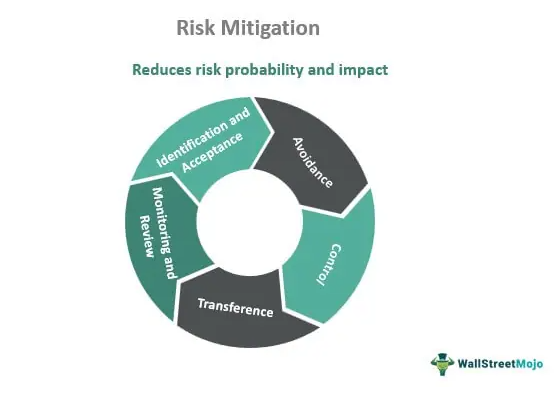
Source: WallStreet Mojo
5. Flexibility: Servant leaders emphasize flexibility in plans and strategies, allowing the organization to adapt swiftly to changing circumstances.
6. Embracing Agility: Leaders encourage teams to embrace agile methodologies, which enable rapid adjustments in response to uncertainty.
7. Learning from Failures: Servant leaders promote a culture of learning from failures, understanding that mistakes provide valuable insights in uncertain situations.
8. Steadfast Support: Leaders provide unwavering support to team members during times of uncertainty, fostering a sense of security.
Impact on IT Transformation
Managing uncertainty has significant implications for successful IT transformation:
• Adaptation: Organizations adept at managing uncertainty can quickly adjust strategies and plans as new information emerges.
• Innovation: Navigating uncertainty encourages innovative thinking and the exploration of alternative solutions.
• Risk Reduction: Effectively managing uncertainty reduces the likelihood of being blindsided by unforeseen challenges.
• Employee Morale: Supportive leadership during uncertain times boosts employee morale and confidence in the organization’s direction.
• Decision Confidence: Managing uncertainty allows leaders to make informed decisions with confidence, even in the face of ambiguity.
• Market Responsiveness: Organizations that navigate uncertainty effectively can respond promptly to market shifts and emerging trends.
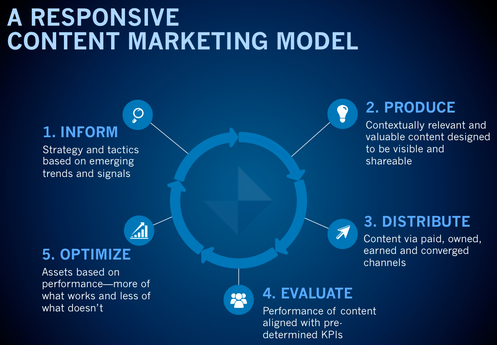
Source: Logic+Emotion
In summary, servant leaders who emphasize managing uncertainty create an environment of resilience, adaptability, and strategic preparation. This approach not only facilitates smoother digital transformation but also nurtures a culture of agility, collaboration, and a proactive stance toward addressing the challenges inherent in the ever-changing business landscape.

Source: Affina Organisation Development
Encouraging Innovation
Encouraging innovation is a pivotal principle within servant leadership that plays a significant role in guiding organizations through the complexities of digital transformation. This principle involves fostering an environment where team members are empowered to think creatively, explore new ideas, and contribute to innovative solutions.
1. Open-Mindedness: Servant leaders maintain an open mind, valuing and welcoming diverse perspectives and novel approaches.
2. Risk-Tolerant Culture: Leaders create a culture that tolerates calculated risks, empowering team members to experiment with innovative ideas.
3. Empowerment: Servant leaders empower team members by giving them the autonomy to explore and implement innovative solutions.

Source: AIHR
4. Resource Allocation: Leaders allocate resources, such as time and budget, to support innovative initiatives and projects.
5. Diverse Teams: Servant leaders form diverse teams, recognizing that different perspectives enhance the potential for innovative breakthroughs.
6. Recognition of Ideas: Leaders acknowledge and appreciate innovative ideas, providing positive reinforcement for creativity.
7. Learning from Failure: Servant leaders encourage learning from failure, understanding that failed attempts contribute to the growth and refinement of innovative concepts.
8. Innovation Platforms: Leaders establish platforms for idea sharing and brainstorming sessions, facilitating the generation of creative solutions.
Impact on IT Transformation
Encouraging innovation has significant implications for successful IT transformation:
• Technological Advancements: An innovative culture drives the exploration and adoption of new technologies that drive digital transformation.
• Competitive Edge: Organizations that encourage innovation gain a competitive advantage by offering unique solutions and experiences.
• Adaptation: Innovative thinking enables organizations to adapt quickly to changing market dynamics and technological advancements.
• Employee Engagement: A culture of innovation engages employees, making them feel valued for their creative contributions.
• Problem-Solving: Innovative approaches lead to more effective and efficient problem-solving in the face of challenges.
• Customer-Centric Solutions: Encouraging innovation helps organizations create customer-centric solutions that address evolving needs.
To conclude, servant leaders who prioritize fostering innovation establish an atmosphere characterized by creativity, adaptability, and forward-looking perspectives. This approach not only supports the seamless progress of digital transformation but also cultivates a culture marked by ongoing enhancement, collaboration, and proactive adaptation to the dynamic challenges of the ever-evolving business environment.
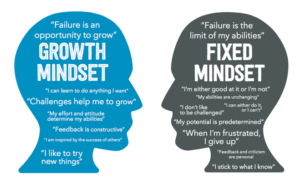
Source: Specialized Therapy Associated
Resilience Building
Resilience building is a significant principle within servant leadership that plays a crucial role in guiding organizations through the complexities of digital transformation. This principle involves cultivating a sense of mental, emotional, and organizational resilience, allowing teams to navigate challenges, setbacks, and uncertainties with strength and determination.
1. Growth Mindset: Servant leaders foster a growth mindset, encouraging team members to view challenges as opportunities for learning and growth.
2. Stress Management: Leaders provide resources and strategies for stress management, helping team members cope with the pressures of transformation.
3. Adaptable Leadership: Servant leaders model adaptability and flexibility, showing how to navigate change without becoming overwhelmed.
4. Cultivating Patience: Leaders emphasize the importance of patience in the face of obstacles and setbacks, understanding that transformation takes time.
5. Learning from Failures: Servant leaders encourage teams to learn from failures and setbacks, using them as stepping stones to resilience.
6. Wellness Support: Leaders promote well-being initiatives, recognizing that a healthy workforce is better equipped to handle challenges.
7. Emotional Intelligence: Servant leaders encourage the development of emotional intelligence, enabling team members to manage emotions effectively.

Source: Stop At Nothing
8. Building Trust: Leaders create a trusting environment where team members feel safe expressing concerns and seeking support.
Impact on IT Transformation
Building resilience has significant implications for successful IT transformation:
• Adaptation: Resilient teams are more adaptable to change and can navigate the complexities of digital transformation more effectively.
• Innovation: Resilience encourages innovative thinking, as team members are more open to exploring new solutions.
• Stress Reduction: Fostering resilience reduces stress levels, preventing burnout and ensuring sustained performance.
• Problem-Solving: Resilient teams approach challenges with a problem-solving mindset, finding solutions even in difficult situations.
• Employee Retention: Organizations that prioritize resilience building retain employees who feel supported and valued during transformation.
• Collaboration: Resilience promotes collaboration, as teams work together to overcome challenges.
In summary, servant leaders who emphasize resilience building create an environment of strength, adaptability, and well-being. This approach not only facilitates smoother digital transformation but also nurtures a culture of growth, collaboration, and proactive response to the challenges posed by the ever-changing business landscape.

Case Study: IBM’s Transformation under Lou Gerstner
Company Background: International Business Machines Corporation (IBM), a multinational technology and consulting company, faced significant challenges in the early 1990s due to changing market dynamics and internal issues. Lou Gerstner, appointed as CEO in 1993, led a remarkable transformation that underscores the significance of flexibility and adaptability in servant leadership.
Flexibility and Adaptability in Servant Leadership:
Scenario: Lou Gerstner’s leadership approach was marked by his emphasis on flexibility and adaptability as key drivers of IBM’s transformation.
1. Recognizing the Need for Change: Upon joining IBM, Gerstner recognized the need for a drastic shift in the company’s culture and strategies to adapt to the changing technology landscape.
2. Customer-Centric Focus: Gerstner realized that IBM needed to become more customer-centric and responsive to clients’ evolving needs and preferences.
3. Embracing a New Direction: Gerstner championed the shift from a product-focused approach to a solutions-oriented approach, which required IBM to adapt its offerings to meet specific customer challenges.
4. Cultural Transformation: Gerstner led a cultural transformation that encouraged employees to embrace change, experiment, and adopt new ways of working.
5. Flexibility in Solutions: Under Gerstner’s leadership, IBM diversified its offerings to include software and services, demonstrating the organization’s flexibility in adapting to emerging market demands.
Impact:
IBM’s emphasis on flexibility and adaptability through servant leadership principles had several positive outcomes:
• Survival and Revival: IBM’s ability to adapt prevented its potential decline and led to its revival as a technology leader.
• Customer Satisfaction: The focus on meeting customer needs through flexible solutions resulted in improved customer satisfaction and loyalty.
• Innovation: A culture of adaptability fostered innovation, enabling IBM to develop new products and services that aligned with market trends.
• Employee Engagement: Employees appreciated the organization’s willingness to change and saw their contributions as valuable in driving transformation.
• Market Leadership: IBM regained its status as an industry leader by leveraging flexibility and adaptability to respond to market shifts.
In conclusion, Lou Gerstner’s leadership at IBM exemplifies how flexibility and adaptability, when integrated with servant leadership principles, can lead to successful organizational transformation. By embracing change, aligning with customer needs, and fostering a culture of experimentation, leaders can guide their organizations through challenges and uncertainties while positioning them for growth and relevance in the ever-changing business landscape.

Source: Gosurvey
Course Manual 6: Focus on Customer Experience
A robust customer-centric focus is a defining characteristic of servant leadership, and it holds particular significance in the context of IT transformation. This principle entails prioritizing the requirements and desires of customers as the central aspect of transformation endeavors, guaranteeing that technological shifts ultimately elevate the overall customer experience.
Understanding Customer Needs
Understanding customer needs is a pivotal aspect of servant leadership that plays a vital role in guiding organizations through the complexities of IT transformation. This principle involves gaining deep insights into the preferences, challenges, and expectations of customers to ensure that technological changes align with their requirements.
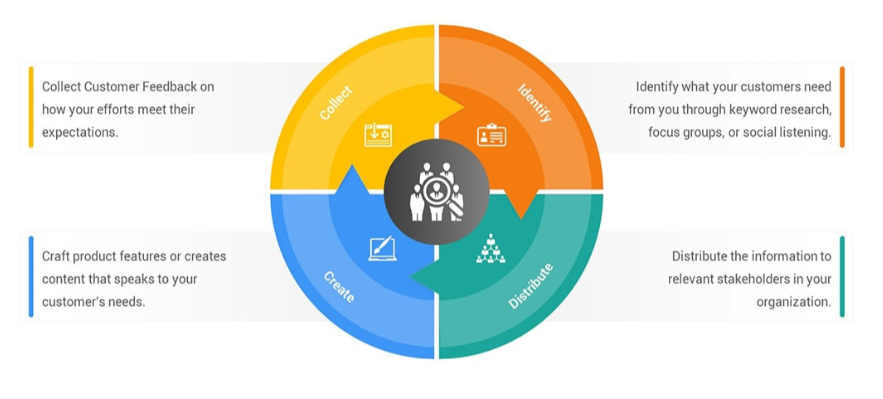
Source: Nulivo Market
1. Customer Research: Servant leaders facilitate thorough customer research to gather data on preferences, pain points, and evolving needs.
2. Empathy Mapping: Leaders employ empathy mapping to understand customers’ emotions, behaviors, and motivations throughout their journey.

Source: MarketingProfs
3. Feedback Channels: Servant leaders establish multiple feedback channels, encouraging direct communication with customers to gather insights.
4. Data Analytics: Leaders analyze data from various sources, such as online behavior and purchase history, to gain insights into customer behaviors.
5. Personas Creation: Servant leaders develop customer personas, representing different segments, to better tailor transformation strategies.
6. Voice of Customer: Leaders prioritize the “voice of the customer” by actively seeking and integrating customer feedback into decisions.
7. User Testing: Servant leaders involve customers in user testing of new technologies, ensuring usability and alignment with their needs.
8. Continuous Listening: Leaders implement ongoing listening strategies to stay attuned to changing customer needs and preferences.
Impact on IT Transformation
Understanding customer needs has significant implications for successful IT transformation:
• Customer Satisfaction: Aligning digital transformation with customer needs leads to higher satisfaction and loyalty.
• Relevance: Technologies developed with customer insights are more likely to address relevant pain points and challenges.
• Innovation: Customer insights drive innovative solutions that cater to evolving preferences and demands.
• Efficiency: Understanding needs streamlines transformation efforts, focusing on changes that truly matter to customers.
• Personalization: Insights enable personalized experiences, enhancing customer engagement and retention.
• Market Positioning: Addressing customer needs can set an organization apart in the competitive market.
In summary, servant leaders who emphasize understanding customer needs create an environment of customer-centricity, innovation, and value creation. This approach not only facilitates smoother digital transformation but also nurtures a culture of responsiveness, collaboration, and proactive alignment with the evolving expectations of customers.
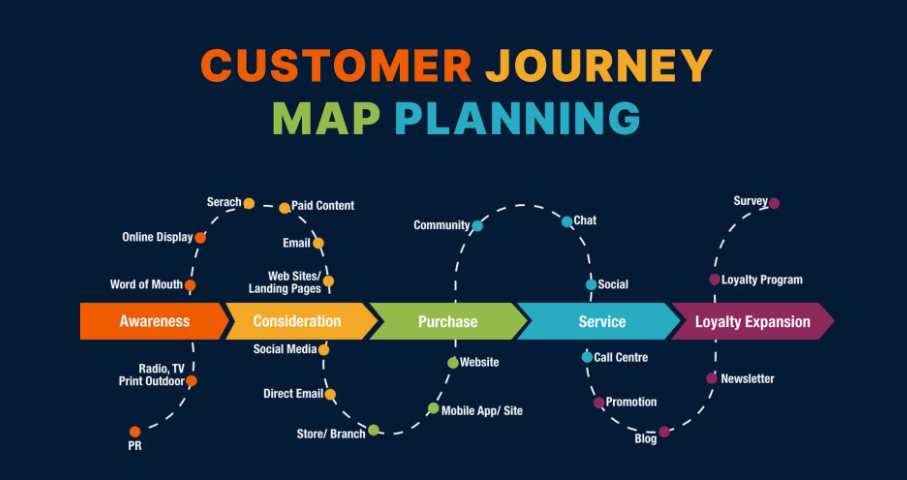
Source: sitecentre
Mapping Customer Journeys
Mapping customer journeys is a vital principle within servant leadership that plays a significant role in guiding organizations through the intricacies of digital transformation. This principle involves visualizing the end-to-end experiences customers have with an organization, identifying touchpoints, pain points, and opportunities for improvement.
1. Visualization: Servant leaders use visual tools to map out the various stages a customer goes through when interacting with the organization.
2. Touchpoint Identification: Leaders pinpoint key touchpoints where customers interact with the organization, whether online or offline.
3. Emotion Analysis: Servant leaders consider the emotions and feelings customers experience at each stage of the journey.
4. Pain Point Identification: Leaders identify pain points or areas where customers face difficulties or frustrations.
5. Opportunity Identification: Servant leaders uncover opportunities to enhance the customer experience and add value at different touchpoints.
6. Cross-Channel Insights: Leaders consider how customers move across various channels, online and offline, to engage with the organization.
7. Collaborative Approach: Servant leaders involve cross-functional teams to ensure a comprehensive understanding of the customer journey.
8. Continuous Refinement: Leaders update and refine the customer journey map regularly to reflect changes in customer behavior and market trends.
Impact on IT Transformation
Mapping customer journeys has significant implications for successful IT transformation:
• Enhanced Customer Experience: Understanding the customer journey enables the organization to enhance experiences and address pain points.
• Data-Driven Decisions: Insights from customer journey mapping guide data-driven decisions for technology implementation.
• Innovation: Identifying opportunities leads to innovative solutions that cater to specific customer needs.
• Holistic Approach: Servant leaders can address the customer experience comprehensively, considering interactions across channels.
• Alignment: Customer journey mapping aligns digital transformation efforts with actual customer behaviors and expectations.
• Empathy: Insights from journey maps foster empathy among team members, as they understand customers’ perspectives better.
Servant leaders who emphasize mapping customer journeys create an environment of empathy, strategic alignment, and continuous improvement. This approach not only facilitates smoother digital transformation but also nurtures a culture of customer-centricity, collaboration, and proactive adaptation to the ever-evolving preferences and expectations of customers.

Source: Aventis Learning Group
Innovation with Purpose
Innovation with purpose is a significant principle within servant leadership that plays a vital role in guiding organizations through the complexities of digital transformation. This principle involves fostering a culture of innovation that is driven by a clear understanding of customer needs, business goals, and the broader impact on stakeholders.
1. Customer-Centric Ideation: Servant leaders encourage teams to generate innovative ideas grounded in customer needs and preferences.

Source: Pepper Content
2. Alignment with Strategy: Leaders ensure that innovative initiatives align with the organization’s overall strategy and goals.
3. Long-Term Value: Servant leaders emphasize creating innovations that deliver lasting value to customers and the organization.
4. Ethical Considerations: Leaders guide teams to consider the ethical implications of innovations and their potential impact on stakeholders.
5. Sustainability: Servant leaders promote innovations that are environmentally and socially responsible.
6. Cross-Functional Collaboration: Leaders foster collaboration among diverse teams to bring a range of perspectives to innovative projects.
7. Iterative Experimentation: Servant leaders encourage iterative experimentation, where ideas are refined based on feedback and learning.
8. Continuous Learning: Leaders emphasize that innovation is a continuous process, encouraging teams to learn from both successes and failures.
Impact on IT Transformation
Innovation with purpose has significant implications for successful IT transformation:
• Strategic Alignment: Innovations that align with strategic objectives drive digital transformation in a focused and purposeful manner.
• Customer Value: Purpose-driven innovations lead to solutions that directly address customer needs and preferences.
• Competitive Advantage: Organizations that innovate with purpose gain a competitive edge by offering unique and valuable solutions.
• Sustainability: Purpose-driven innovations contribute to long-term sustainability and positive impact on society.
• Engaged Workforce: Teams are motivated and engaged when working on innovations that align with a meaningful purpose.
• Adaptation: Purpose-driven innovations allow organizations to adapt to changing market demands and technological shifts.
To conclude, servant leaders who prioritize purposeful innovation establish an atmosphere characterized by strategic alignment, value generation, and positive outcomes. This approach not only facilitates the seamless progression of digital transformation but also cultivates a culture marked by creativity, collaborative efforts, and a proactive drive to provide solutions that deliver significant value to customers, stakeholders, and the entire organization.
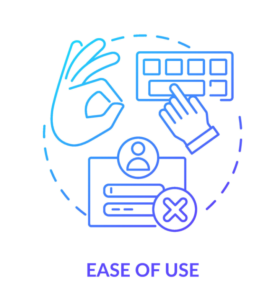
Source: Vecteezy
Ease of Use
Ensuring ease of use is a fundamental principle within servant leadership that plays a significant role in guiding organizations through the intricacies of digital transformation. This principle involves designing and implementing technological solutions that are intuitive, user-friendly, and accessible to a wide range of users.
1. User-Centered Design: Servant leaders emphasize designing technologies with users’ needs, preferences, and capabilities in mind.
2. Simplicity: Leaders advocate for simple and straightforward user interfaces, minimizing complexity and cognitive load.
3. User Testing: Servant leaders involve users in the testing phase to identify pain points, areas of confusion, and opportunities for improvement.
4. Accessibility: Leaders ensure that technologies are accessible to individuals with disabilities, promoting inclusivity.
5. Clear Instructions: Servant leaders provide clear instructions and guidance within the technology to help users navigate effectively.
6. Feedback Mechanisms: Leaders incorporate feedback mechanisms so users can provide input on their experience and suggest improvements.
7. Continuous Iteration: Servant leaders promote a culture of continuous improvement, refining technology based on user feedback and changing needs.
8. Training and Support: Leaders offer training and support resources to empower users and ensure they can make the most of the technology.
Impact on IT Transformation
Ensuring ease of use has significant implications for successful IT transformation:
• User Adoption: User-friendly technologies are more likely to be embraced by users, leading to higher adoption rates.
• Efficiency: Intuitive interfaces streamline processes and enhance efficiency, contributing to the success of transformation efforts.
• Reduced Resistance: Technologies that are easy to use reduce resistance to change and facilitate a smoother transition.
• Inclusivity: Prioritizing accessibility ensures that all users can benefit from technological solutions.
• User Satisfaction: Easy-to-use technologies contribute to higher user satisfaction and a positive overall experience.
• Effective Training: Ease of use minimizes the learning curve, making training more effective and efficient.
In summary, servant leaders who emphasize ease of use create an environment of user-centricity, efficiency, and inclusivity. This approach not only facilitates smoother digital transformation but also nurtures a culture of usability, collaboration, and proactive enhancement of technological solutions to better meet the needs of users and stakeholders.

Personalization
Personalization is a crucial principle within servant leadership that plays a significant role in guiding organizations through the intricacies of digital transformation. This principle involves tailoring experiences, content, and interactions to individual user preferences, enhancing engagement and relevance.
1. User Data Utilization: Servant leaders ensure that user data is collected ethically and used to personalize experiences.
2. Behavioral Insights: Leaders analyze user behaviors to understand preferences and patterns, enabling effective personalization.
3. Segmentation: Servant leaders segment users based on characteristics and behaviors to provide targeted experiences.
4. Content Customization: Leaders offer content that resonates with individual users’ interests and needs.
5. Product Recommendations: Servant leaders provide personalized product or service recommendations based on user preferences.
6. Dynamic Interfaces: Leaders create interfaces that adapt to users’ preferences, making interactions more seamless.
7. Opt-In Mechanisms: Servant leaders respect users’ privacy by offering opt-in options for personalization.
8. Feedback Loop: Leaders incorporate user feedback on personalization to fine-tune and enhance the experience.
Impact on IT Transformation
Personalization has significant implications for successful IT transformation:
• Enhanced Engagement: Personalized experiences capture users’ attention and drive higher engagement.
• Improved Conversions: Relevant recommendations and content increase the likelihood of conversions and sales.
• Customer Loyalty: Personalization builds a sense of connection and loyalty among users.

Source: Nimble CRM
• Efficient Interactions: Tailored experiences streamline interactions, making them more efficient and effective.
• Data-Driven Insights: Personalization generates insights into user preferences, informing strategic decisions.
• Competitive Advantage: Organizations that excel in personalization differentiate themselves in the market.
In summary, servant leaders who emphasize personalization create an environment of engagement, relevance, and user-centeredness. This approach not only facilitates smoother digital transformation but also nurtures a culture of responsiveness, innovation, and proactive adaptation to individual user needs and preferences.
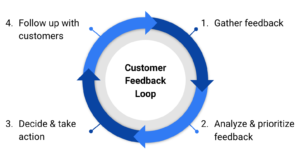
Source: Convas
Feedback Loop
The feedback loop is a critical principle within servant leadership that plays a vital role in guiding organizations through the intricacies of digital transformation. This principle involves creating a continuous cycle of gathering, analyzing, and incorporating feedback from users to enhance digital solutions and experiences.
1. Feedback Collection: Servant leaders establish mechanisms for collecting feedback from users through surveys, reviews, and direct interactions.
2. Multiple Touchpoints: Leaders ensure that feedback can be collected at various touchpoints in the user journey.
3. Diverse Sources: Servant leaders gather feedback from a diverse range of users to capture different perspectives.
4. Real-Time Insights: Leaders prioritize real-time feedback to address issues promptly and improve user experiences.
5. Feedback Analysis: Servant leaders analyze feedback to identify patterns, trends, and areas for improvement.
6. Continuous Improvement: Leaders use feedback as a foundation for iterative improvements to digital solutions.
7. Transparency: Servant leaders communicate the actions taken based on feedback, fostering transparency and trust.
8. User Involvement: Leaders involve users in the feedback loop, making them active participants in shaping the digital experience.
Impact on IT Transformation
Implementing an effective feedback loop has significant implications for successful IT transformation:
• Enhanced User-Centricity: Feedback ensures that digital solutions align with user needs and preferences.
• Proactive Adaptation: Insights from feedback enable organizations to make proactive adjustments to technology.
• Issue Resolution: Rapid response to feedback helps resolve issues before they escalate and affect user satisfaction.
• Innovation: Feedback often leads to innovative solutions that address evolving user requirements.
• User Engagement: Involving users in the feedback loop increases their engagement and sense of ownership.
• Brand Loyalty: Organizations that value and act on user feedback foster brand loyalty.
In summary, servant leaders who emphasize the feedback loop create an environment of responsiveness, improvement, and active collaboration with users. This approach not only facilitates smoother digital transformation but also nurtures a culture of ongoing learning, innovation, and continuous enhancement of digital solutions based on the valuable insights provided by users.
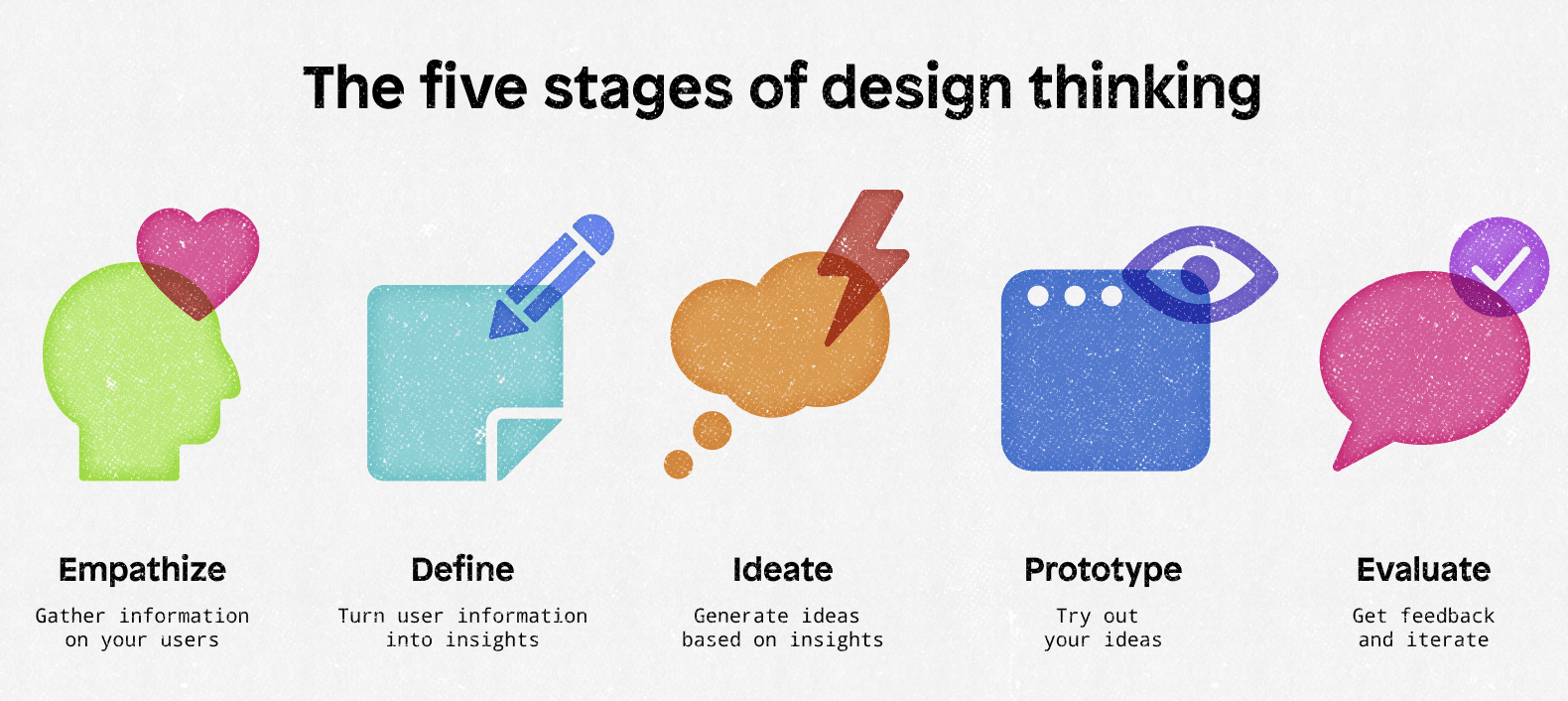
Source: Mendix
Empathy in Design
Empathy in design is a vital principle within servant leadership that plays a significant role in guiding organizations through the intricacies of digital transformation. This principle involves designing digital solutions with a deep understanding of users’ emotions, needs, and experiences to create meaningful and user-centric products.
1. User-Centered Approach: Servant leaders prioritize the needs and feelings of users at every stage of the design process.
2. User Personas: Leaders create detailed user personas that capture various user characteristics, behaviors, and preferences.
3. Emotion Mapping: Servant leaders map out users’ emotional journeys to understand their feelings at different touchpoints.
4. Empathy Interviews: Leaders conduct empathy interviews to gain firsthand insights into users’ pain points and aspirations.
5. Accessibility: Servant leaders ensure that digital solutions are accessible to a diverse range of users, considering different abilities and needs.
6. Inclusive Design: Leaders design with inclusivity in mind, considering a wide range of user backgrounds and experiences.
7. Usability Testing: Servant leaders involve users in usability testing to gather direct feedback on their experience with the design.
8. Iterative Refinement: Leaders iterate and refine designs based on user feedback and insights, ensuring continuous improvement.
Impact on IT Transformation
Integrating empathy in design has significant implications for successful IT transformation:
• User Satisfaction: Empathetic design creates solutions that resonate with users, leading to higher satisfaction.
• Engagement: User-centric design enhances engagement by addressing users’ emotional needs.
• Adoption: Solutions that empathetically address user needs are more likely to be adopted.
• Innovation: Empathy sparks innovative ideas that cater to unmet user needs and preferences.
• Brand Perception: Organizations that show empathy through design build positive brand perceptions.
• Accessibility: An empathetic approach ensures that digital solutions are accessible to a wide range of users.
In conclusion, servant leaders who prioritize empathy in design foster an atmosphere of user-focused orientation, emotional resonance, and intentional innovation. This approach not only facilitates the seamless progression of digital transformation but also cultivates a culture marked by inclusiveness, collaborative efforts, and ongoing refinement of digital solutions that authentically align with users’ emotions and requirements.

Source: Pacific Research Laboratories
Iterative Improvement
Iterative improvement is a crucial principle within servant leadership that plays a significant role in guiding organizations through the intricacies of digital transformation. This principle involves adopting a continuous cycle of refining, enhancing, and optimizing digital solutions based on user feedback, changing needs, and emerging technologies.
1. Feedback Integration: Servant leaders actively incorporate feedback from users and stakeholders into the improvement process.
2. Regular Evaluation: Leaders establish regular intervals for evaluating the performance and effectiveness of digital solutions.
3. Performance Metrics: Servant leaders define clear performance metrics to measure the impact and success of digital solutions.
4. User-Centric Changes: Leaders prioritize changes that align with users’ evolving preferences and expectations.
5. Agile Methodologies: Servant leaders adopt agile methodologies that promote frequent iterations and adjustments.
6. Data-Driven Insights: Leaders use data analytics to gain insights into user behaviors and trends for informed improvements.

Source: Unscrambl
7. Experimentation: Servant leaders encourage experimentation and testing of new features or enhancements.
8. Cross-Functional Collaboration: Leaders involve cross-functional teams to bring diverse perspectives and expertise to the improvement process.
Impact on IT Transformation
Practicing iterative improvement has significant implications for successful IT transformation:
• Adaptation: Organizations can adapt to changing market trends and technological advancements more effectively.
• Continuous Enhancement: Regular improvements keep digital solutions up to date and aligned with user needs.
• User Satisfaction: Iterative improvement leads to solutions that better meet user preferences and expectations.
• Efficiency: Optimizations enhance efficiency and usability, improving the overall effectiveness of solutions.
• Innovation: Iterations often lead to innovative enhancements that can set the organization apart.
• Agility: An iterative approach enhances organizational agility, enabling quick responses to changing demands.
In summary, servant leaders who emphasize iterative improvement create an environment of agility, user-centricity, and perpetual advancement. This approach not only facilitates the seamless progression of digital transformation but also nurtures a culture of collaboration, innovation, and a proactive pursuit of excellence in digital solutions, ensuring they remain relevant and valuable in the dynamic business landscape.

Source: Customer Service Manager Magazine
Enhanced Loyalty
Enhanced loyalty is a pivotal principle within servant leadership that plays a significant role in guiding organizations through the intricacies of digital transformation. This principle involves fostering deep connections and trust with users, leading to increased loyalty and a stronger bond between the organization and its stakeholders.
1. Consistent Value: Servant leaders consistently provide value to users through digital solutions, building trust and loyalty over time.
2. Reliability: Leaders ensure that digital solutions perform reliably, meeting users’ expectations consistently.
3. Responsive Support: Servant leaders offer timely and effective support, addressing users’ concerns and issues promptly.
4. Transparency: Leaders communicate openly about changes, updates, and challenges, fostering transparency and trust.
5. Tailored Experiences: Servant leaders personalize experiences to cater to individual preferences, enhancing user satisfaction and loyalty.
6. Proactive Engagement: Leaders engage with users proactively, seeking feedback and actively addressing their needs.
7. Customer-Centric Culture: Servant leaders instil a customer-centric culture that prioritizes users’ needs throughout the organization.
8. Long-Term Relationships: Leaders focus on building long-term relationships with users rather than short-term gains.
Impact on IT Transformation
Fostering enhanced loyalty has significant implications for successful IT transformation:
• User Retention: Loyal users are more likely to continue using digital solutions and services.
• Advocacy: Loyal users become advocates, promoting the organization to others and contributing to organic growth.
• Brand Reputation: Organizations that prioritize loyalty build a positive brand reputation and image.
• Resilience: Loyal users are more forgiving of challenges and changes, contributing to smoother transformation efforts.
• Continuous Improvement: Loyal users provide valuable feedback for ongoing improvement of digital solutions.
• Sustainable Growth: Enhanced loyalty leads to sustainable growth and a dedicated user base.
Servant leaders who emphasize enhanced loyalty create an environment of trust, commitment, and long-lasting relationships. This approach not only facilitates the seamless progression of digital transformation but also nurtures a culture of customer-centricity, collaboration, and proactive efforts to ensure users’ ongoing satisfaction, ultimately leading to greater loyalty and sustainable success.

Case Study: Apple’s Customer-Centric Approach under Steve Jobs
Customer Background: Apple Inc., a global technology and innovation leader, is known for its customer-centric approach that prioritizes user experience. The tenure of Steve Jobs as co-founder and CEO exemplifies the significance of focusing on customer experience in servant leadership.
Focusing on Customer Experience in Servant Leadership:
Scenario: Steve Jobs’ leadership approach was rooted in his commitment to delivering exceptional customer experiences through innovative products and design.
1. User-Centric Design: Jobs believed in designing products that resonate with users’ needs and desires. This approach drove the creation of user-friendly interfaces and sleek, functional designs.
2. Customer Empathy: Jobs and his teams emphasized understanding customers’ pain points and aspirations, which guided the development of products that addressed these needs.
3. Simplicity: Jobs believed in simplifying complex technology to make it accessible and enjoyable for customers. The intuitive nature of Apple products reflects this focus on user experience.
4. Innovative Solutions: Jobs encouraged his teams to think creatively and challenge conventional norms, resulting in groundbreaking products like the iPod, iPhone, and iPad.
5. Aesthetic Appeal: The aesthetics of Apple products were carefully crafted to not only be functional but also visually appealing, contributing to a holistic customer experience.
Impact:
Apple’s emphasis on focusing on customer experience through servant leadership principles had several positive outcomes:
• Brand Loyalty: Apple’s commitment to user satisfaction led to a strong and loyal customer base that eagerly awaited new product releases.
• Market Leadership: Apple’s reputation for delivering exceptional customer experiences positioned it as a leader in the technology industry.
• Innovation: The relentless pursuit of customer satisfaction drove continuous innovation, propelling Apple to develop products that reshaped industries.
• User-Friendly Technology: Apple’s intuitive products simplified technology, making it accessible to a broader audience.
• Cultural Impact: The user experience-focused approach set industry standards, influencing competitors to prioritize customer-centric design.
In conclusion, Steve Jobs’ leadership at Apple illustrates how focusing on customer experience, integrated with servant leadership principles, can lead to remarkable success. By putting customers’ needs at the center of product development, leaders can create transformative experiences that not only drive brand loyalty but also revolutionize industries and elevate organizations to new heights.
Workshop Exercises

Workshop Subject Exercises
01. Part 1: Explain in your own words how this process will directly impact upon your department?
02. Part 2: Explain in your own words how this process will directly impact upon your department?
03. Part 3: Explain in your own words how this process will directly impact upon your department?
04. Part 4: Explain in your own words how this process will directly impact upon your department?
05. Part 5: Explain in your own words how this process will directly impact upon your department?
06. Part 6: Explain in your own words how this process will directly impact upon your department?
07. Part 7: Explain in your own words how this process will directly impact upon your department?
08. Part 8: Explain in your own words how this process will directly impact upon your department?
09. Part 9: Explain in your own words how this process will directly impact upon your department?
10. Part 10: Explain in your own words how this process will directly impact upon your department?

SWOT & MOST Analysis Exercises
01. Undertake a detailed SWOT Analysis in order to identify your department’s internal strengths and weaknesses and external opportunities and threats in relation to each of the 12 Workshop Title processes featured above. Undertake this task together with your department’s stakeholders in order to encourage collaborative evaluation.
02. Develop a detailed MOST Analysis in order to establish your department’s: Mission; Objectives; Strategies and Tasks in relation to Workshop Title. Undertake this task together with all of your department’s stakeholders in order to encourage collaborative evaluation.
Project Studies
Project Study (Part 1) – Customer Service
The Head of this Department is to provide a detailed report relating to the Workshop Subject process that has been implemented within their department, together with all key stakeholders, as a result of conducting this workshop, incorporating process: planning; development; implementation; management; and review. Your process should feature the following 12 parts:
01. Part 1
02. Part 2
03. Part 3
04. Part 4
05. Part 5
06. Part 6
07. Part 7
08. Part 8
09. Part 9
10. Part 10
Please include the results of the initial evaluation and assessment.
Project Study (Part 2) – E-Business
The Head of this Department is to provide a detailed report relating to the Workshop Subject process that has been implemented within their department, together with all key stakeholders, as a result of conducting this workshop, incorporating process: planning; development; implementation; management; and review. Your process should feature the following 12 parts:
01. Part 1
02. Part 2
03. Part 3
04. Part 4
05. Part 5
06. Part 6
07. Part 7
08. Part 8
09. Part 9
10. Part 10
11. Part 11
12. Part 12
Please include the results of the initial evaluation and assessment.
Project Study (Part 3) – Finance
The Head of this Department is to provide a detailed report relating to the Workshop Subject process that has been implemented within their department, together with all key stakeholders, as a result of conducting this workshop, incorporating process: planning; development; implementation; management; and review. Your process should feature the following 12 parts:
01. Part 1
02. Part 2
03. Part 3
04. Part 4
05. Part 5
06. Part 6
07. Part 7
08. Part 8
09. Part 9
10. Part 10
11. Part 11
12. Part 12
Please include the results of the initial evaluation and assessment.
Project Study (Part 4) – Globalization
The Head of this Department is to provide a detailed report relating to the Workshop Subject process that has been implemented within their department, together with all key stakeholders, as a result of conducting this workshop, incorporating process: planning; development; implementation; management; and review. Your process should feature the following 12 parts:
01. Part 1
02. Part 2
03. Part 3
04. Part 4
05. Part 5
06. Part 6
07. Part 7
08. Part 8
09. Part 9
10. Part 10
11. Part 11
12. Part 12
Please include the results of the initial evaluation and assessment.
Project Study (Part 5) – Human Resources
The Head of this Department is to provide a detailed report relating to the Workshop Subject process that has been implemented within their department, together with all key stakeholders, as a result of conducting this workshop, incorporating process: planning; development; implementation; management; and review. Your process should feature the following 12 parts:
01. Part 1
02. Part 2
03. Part 3
04. Part 4
05. Part 5
06. Part 6
07. Part 7
08. Part 8
09. Part 9
10. Part 10
11. Part 11
12. Part 12
Please include the results of the initial evaluation and assessment.
Project Study (Part 6) – Information Technology
The Head of this Department is to provide a detailed report relating to the Workshop Subject process that has been implemented within their department, together with all key stakeholders, as a result of conducting this workshop, incorporating process: planning; development; implementation; management; and review. Your process should feature the following 12 parts:
01. Part 1
02. Part 2
03. Part 3
04. Part 4
05. Part 5
06. Part 6
07. Part 7
08. Part 8
09. Part 9
10. Part 10
11. Part 11
12. Part 12
Please include the results of the initial evaluation and assessment.
Project Study (Part 7) – Legal
The Head of this Department is to provide a detailed report relating to the Workshop Subject process that has been implemented within their department, together with all key stakeholders, as a result of conducting this workshop, incorporating process: planning; development; implementation; management; and review. Your process should feature the following 12 parts:
01. Part 1
02. Part 2
03. Part 3
04. Part 4
05. Part 5
06. Part 6
07. Part 7
08. Part 8
09. Part 9
10. Part 10
11. Part 11
12. Part 12
Please include the results of the initial evaluation and assessment.
Project Study (Part 8) – Management
The Head of this Department is to provide a detailed report relating to the Workshop Subject process that has been implemented within their department, together with all key stakeholders, as a result of conducting this workshop, incorporating process: planning; development; implementation; management; and review. Your process should feature the following 12 parts:
01. Part 1
02. Part 2
03. Part 3
04. Part 4
05. Part 5
06. Part 6
07. Part 7
08. Part 8
09. Part 9
10. Part 10
11. Part 11
12. Part 12
Please include the results of the initial evaluation and assessment.

Project Study (Part 9) – Marketing
The Head of this Department is to provide a detailed report relating to the Workshop Subject process that has been implemented within their department, together with all key stakeholders, as a result of conducting this workshop, incorporating process: planning; development; implementation; management; and review. Your process should feature the following 12 parts:
01. Part 1
02. Part 2
03. Part 3
04. Part 4
05. Part 5
06. Part 6
07. Part 7
08. Part 8
09. Part 9
10. Part 10
11. Part 11
12. Part 12
Please include the results of the initial evaluation and assessment.

Project Study (Part 10) – Production
The Head of this Department is to provide a detailed report relating to the Workshop Subject process that has been implemented within their department, together with all key stakeholders, as a result of conducting this workshop, incorporating process: planning; development; implementation; management; and review. Your process should feature the following 12 parts:
01. Part 1
02. Part 2
03. Part 3
04. Part 4
05. Part 5
06. Part 6
07. Part 7
08. Part 8
09. Part 9
10. Part 10
11. Part 11
12. Part 12
Please include the results of the initial evaluation and assessment.

Project Study (Part 11) – Logistics
The Head of this Department is to provide a detailed report relating to the Workshop Subject process that has been implemented within their department, together with all key stakeholders, as a result of conducting this workshop, incorporating process: planning; development; implementation; management; and review. Your process should feature the following 12 parts:
01. Part 1
02. Part 2
03. Part 3
04. Part 4
05. Part 5
06. Part 6
07. Part 7
08. Part 8
09. Part 9
10. Part 10
11. Part 11
12. Part 12
Please include the results of the initial evaluation and assessment.

Project Study (Part 12) – Education
The Head of this Department is to provide a detailed report relating to the Workshop Subject process that has been implemented within their department, together with all key stakeholders, as a result of conducting this workshop, incorporating process: planning; development; implementation; management; and review. Your process should feature the following 12 parts:
01. Part 1
02. Part 2
03. Part 3
04. Part 4
05. Part 5
06. Part 6
07. Part 7
08. Part 8
09. Part 9
10. Part 10
11. Part 11
12. Part 12
Please include the results of the initial evaluation and assessment.
Program Benefits
Department 1
- Benefit 1
- Benefit 2
- Benefit 3
- Benefit 4
- Benefit 5
- Benefit 6
- Benefit 7
- Benefit 8
- Benefit 9
- Benefit 10
Department 2
- Benefit 1
- Benefit 2
- Benefit 3
- Benefit 4
- Benefit 5
- Benefit 6
- Benefit 7
- Benefit 8
- Benefit 9
- Benefit 10
Department 3
- Benefit 1
- Benefit 2
- Benefit 3
- Benefit 4
- Benefit 5
- Benefit 6
- Benefit 7
- Benefit 8
- Benefit 9
- Benefit 10
Client Telephone Conference (CTC)
If you have any questions or if you would like to arrange a Client Telephone Conference (CTC) to discuss this particular Unique Consulting Service Proposition (UCSP) in more detail, please CLICK HERE.


























